

Tao Te Ching
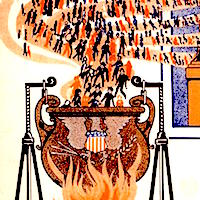
American (USA) Lineage
As communications systems continually expand their range and power, people become more and more aware of the larger world - people vastly different from themselves in appearance, culture, politics and religion. At the same time as these differences become apparent, our basic human roots and the commonality we all share also jump into clear view. Even humans and chimpanzees share a shockingly high percentage of DNA - 98.8%. The differences between our different “race” categories are so small that most anthropologists describe race as a social category not corresponding to biological variation.
In contradistinction to this scientific similarity, the stresses of modern times and the fears generated from the unprecedented speed of change modern cultures grappling with; nationalistic, isolationist, and racial/cultural/religious supremacist views rapidly arise. The impossibility of going back, returning to more simple and idyllic times is symbolized in the Book of Genesis by Lot's wife becoming a pillar of salt and by Marshall McLuhan’s image of driving forward into the future while looking in the rear view mirror.
Awareness and a necessity of world oneness, the expanding need for international understanding, cooperation, and mutual support daily increase in spite of our fears, resistance, and struggle against it. As history’s biggest cultural, racial, religious, political melting pot experiment; America may become more and more a model for the world’s future structure. The strong and mindless partisanship in the USA today; the aggression toward other countries; the continuing racial, gender, and sexual preference discrimination; the hypnotized electorates, fake news advocates, and true believers of all stripes; this all may become in the future lessons for what not to do, for what works, and for the best ways to go forward with this evolutionary world unification. And if the USA somehow manages to work through these challenges, the “united states” could become a blueprint for a “united world,” finally become more like the often claimed, Sermon on the Mount image “light of the world, shining city upon a hill.”
“Either the United States will destroy ignorance or ignorance will destroy the United States.” — W.E.B. Du Bois
People (154)
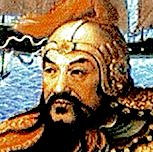
Zheng He 鄭和
1371 – 1435 CE
Emperor Zhu Di’s closest advisor, over 100 kg, over 2 meter tall formidable eunuch soldier, and famous Muslim explorer; Zheng He and the other admirals he trained in ships 4-5x bigger than Columbus’s sailed through the Strait of Magellan 98 years before Magellan, up and down the North American coasts 70 years before Columbus, surveyed the Arctic polar region and Antarctica 400 years before Europeans, Australia 300 years before Captain Cook, and rounded the Cape of Good Hope 66 years before the Portuguese Dias. Modern scholars credit him with "reshaping Asia" and propose that all of 15th century naval history was basically his story and the consequences of his voyages. Commanding a fleet of over 2000 ships carrying libraries of over 11,000 books to share information and technology with the rest of the world, Zheng He’s legacy is little known but one of the most influential in all history.
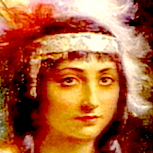
Pocahontas (Matoaka)
1596 – 1617 CE
Daughter of a powerful Native American Chief, savior of John Smith, supporter of the Jamestown colony, and the first Native American featured on a US stamp; Pocahontas was captured and held for ransom during an English-Indian war. Instead of returning to her tribe when she could, she stayed with the English, converted to Christianity and proceed to convert hearts and minds in both America and Europe. Her name literally means “little reckless” and she was called in Europe a "civilized savage" but history clarifies the European savagery, the Native American wisdom. Her descendants include two first ladies, Nancy Reagan and Woodrow Wilson's wife, Edith Wilson; actor Glenn Strange famous for his roles as Frankenstein’s monster and the Gunsmoke bartender; as well as astronomer Percival Lowell responsible for the discovery of Pluto and an important inspiration for H.G. Wells, Robert Heinlein, Ray Bradbury, and Edgar Rice Burroughs.

Benjamin Lay
1682 – 1759 CE
Benjamin Lay (1682 - 1759)
Physical dwarf but moral giant, “the world’s first revolutionary abolitionist,” inspiration for generations, wild, confrontational, and uncompromising opponent of slavery; Benjamin Lay wrote over 200 polemics against slavery, sweatshops, over-consumptions, capital punishment, the prison system, decadent rich elites, and for vegetarianism, animal rights and sustainability. Living a lifestyle of almost complete self-sustenance, he grew his his own food, made his own clothes, lived in a cave eating only fruits and vegetables, and wouldn’t use anything that came from the killing of animals. Unconstrained even when abandoned by his fellow Quakers (who later commonly kept pictures of him in their homes), he became the prototype of a class and race-conscious, environmental ultra radical and pioneered ways of protesting still used today.

Benjamin Franklin
1706 – 1790 CE
Beginning his adult life as a penniless runaway, Franklin became one of the world’s most admired people. He was a founding father, diplomat, scientist, philosopher, businessman, inventor, and the politician most responsible for winning the Revolutionary War. His inventions included the lightning rod, bifocals, the Franklin stove, and he helped start many new civic organizations including voluntary fire departments and paid police forces. He recreated the slogan/quote tradition of Aesop and Atisa that we continue in our “Comments” link.

George Mason
1725 – 1792 CE
First American abolitionist, founding father, and Constitutional savior
American Founding Father, author and primary advocate for the original Bill of Rights, George Washington friend and neighbor, and “the first known abolitionist”; George Mason helped create the American political foundation. Although he wrote many of the clauses and points in the Constitution, he was one of only 3 delegates who refused to sign it because of it sanctioning slavery. Recognizing defects in the Constitution and the inevitable need to change it, he became instrumental in bringing into the constitution provisions for changing it (Amendments) and for adding new states. This made it easy to make changes without violence while creating a strong foundation for the trajectory that became a transoceanic federal republic. The primary force for including articles of impeachment into the Constitution, he wrote the phrase, “other high crimes and misdemeanors.” Because he remained a contrarian and because most of his papers were lost in fire, history doesn’t remember him well and he became "a prophet without honor in his own country.” The results of his efforts, however, brilliantly support modern political freedoms.
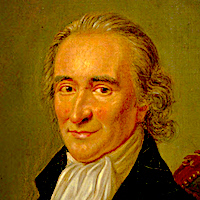
Thomas Paine
1737 – 1809 CE
Fired from his government post in England because of his efforts for the working class and running to escape debtor’s prison, Paine brought a letter of recommendation from Benjamin Franklin to the new world and quickly established himself as a voice for freedom, liberty, women’s rights, prison reform, Newtonian science, and anti-slavery efforts. From a poor family growing up during a time when thousands of small farmers were becoming serf-like factory workers and the gap between super rich and super poor was becoming extreme; he educated himself, became a Founding Father, one of the most essential influences on the Revolutionary War, gave the United States of America it’s name, and wrote the rough draft that Jefferson used to craft the Declaration of Independence. John Adams said that, “Without the pen of Paine, the sword of Washington would have been wielded in vain.” The first to lobby for a Social Security system, his influence extended from American to England, France, South America, and all countries seeking freedom, social justice, and moral equality.
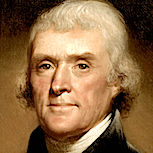
Thomas Jefferson
1743 – 1826 CE
American founding father, main author of the Declaration of Independence, Virginia governor, first Secretary of State, US Vice President and one of America’s greatest presidents; Jefferson negotiated the Louisiana Purchase almost doubling the size of the country and wrote a book considered the most important American one written before 1800. President of the American Philosophical Society, mathematician, architect/designer of the Virginia State Capitol and Monticello, University of Virginia founder, avid horticulturalist and farmer, naturalist deeply interested in birds, inventor of an important new plow design as well as the swivel chair, and speaker of more than 8 languages; he exemplified the ideal of a true Renaissance Man. Although he owned hundreds of slaves, as a young lawyer he defended freedom-seeking slaves, signed an act prohibiting their importation in 1807, and is believed to have secretly “married” and had children with a black woman, Sally Hemings. Always in debt with cash flow problems from continual experiments and pushing on the boundaries of the possible, his creative spirit never died.
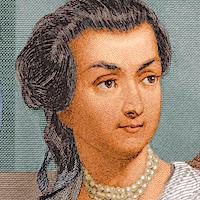
Abigail Adams
1744 – 1818 CE
One of the most exceptional women in American history
The first USA Second Lady and second First Lady, wife and advisor to president John Adams, mother of president John Quincy Adams, and one of the most exceptional women in American history; Abigail Adams became instrumental in the founding of the United States. A powerful influence for women’s rights, she emphasized the need for their education. A strong voice against slavery, she believed it was evil and a threat to democracy. Opposed to dogmatic, superstitious religious belief, she advocated for a heart-felt connection with a wisdom beyond words rather than a rote belief. Her accomplishments become more impressive when you consider the culture of her time when women’s roles were mainly domestic and educating women was considered foolish. Abigail never went to school but her self-education made her the most wise and influential in an extremely influential family.
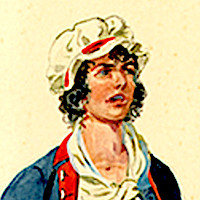
Margaret Cochran Corbin
1751 – 1800 CE
Early American hero
A gruff, smoking, antagonistic camp follower, nurse, and American hero; Margaret Corbin became the first U.S. woman to receive a military service pension. When only 5 years old, her father was killed when their home was raided by Native Americans and her mother taken never to return. This began a difficult life presenting numerous challenges that she enthusiastically and quickly met. In order to join her husband in battle, she dressed like a man and accompanied him to his posts. She took his place firing a cannon when he was killed and continued until she was too injured to continue and lost use of her left arm for life. Her fellow-soldiers called her “Captain Molly” and praised her cannon-firing skills. The highest-honored woman of the Revolutionary War, she was buried with full honors in the West Point cemetery and a monument was built for her.
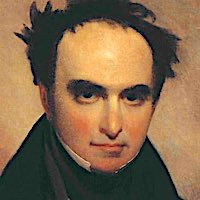
Daniel Webster
1782 – 1852 CE
America's greatest orator
Two-time US Secretary of State and presidential candidate, leading Supreme Court attorney, and Senator; Daniel Webster was named as one of the five greatest senators in history, gave "the most eloquent speech ever delivered in Congress,” and his style—for at least 75 years—became the main exercise for students of oratory. A key supporter of President John Quincy Adams and leading opponent of Andrew Jackson, historians consider him instrumental in maintaining United States union over the Southern efforts of creating a states-rights Confederacy. In John F. Kennedy’s book Profiles in Courage, he described one of his positions risking denunciations and his presidential ambitions, one of the “greatest acts of courageous principle in the history of the Senate.” On the other hand however, he supported wars against Native Americans, the Fugitive Slave Act of 1850, war against England because they wouldn’t return fugitive slaves, and opposed the Dorr Rebellion. In many ways, Webster represents the art of compromise—both the positive and negative aspects of giving away something important for something even more important. For example, he supported the Fugitive Slave Act of 1850 which made it easier for slave owners to recapture runaway slaves; but, in exchange, California was admitted into the Union as a non-slave state tipping the balance to more non-slave than slave states.
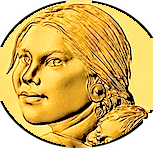
Sacagawea
1788 – 1812 CE
When 12, kidnapped and claimed by a rival tribe after a battle, when 13 won as 2nd wife by a gambling trapper, when 17 hired as guide and translator by the Lewis and Clarke expedition; Sacagawea traveled thousands of difficult miles sometimes surviving on only candles but saving and assuring the expedition’s success while opening communication with many isolated groups and spreading understanding. Immortalized in the names of rivers, mountains, parks, and trails; on a US 1$ coin, in literature, and in music from Phillip Glass to Stevie Wonder; she was considered a hero and taken as an example of strength, independence, and self-worth by the Women’s Suffrage Association.
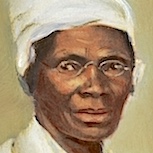
Sojourner Truth (Isabella (“Bell”) Baumfree)
1797 – 1883 CE
Born into slavery and now listed in the “100 Most Significant Americans of All Time,” Sojourner escaped with her infant daughter, went to court trying to get her son back and became the first black woman to win a case like this. She traveled extensively promoting the abolition of slavery, helped recruit black troops during the Civil War and tried to get land grants for freed slaves after the war. A powerful women's rights activist and friend of Susan B. Anthony, she gave one of the most famous speeches on women's rights and is considered a saint by both the Episcopal and Lutheran churches.
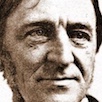
Ralph Waldo Emerson
1803 – 1882 CE
Champion of individualism
Friend and mentor to Henry David Thoreau and godfather to William James, Emerson championed individualism as a counterbalance to society’s conformist pressures. He wrote what Oliver Wendell Holmes considered America's “Intellectual Declaration of Independence” and he summarized his philosophy as “the infinitude of the private man.” The most influential writer of 19th-century America, he was called “the Concord Sage” and became the leading voice of intellectual culture in the United States influencing American religions to become more gnostic, less fundamentalist and conservative.
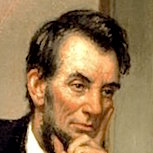
Abraham Lincoln
1809 – 1865 CE
Greatest American president, iconclast, skeptic, self-educated lawyer and congressman opposed to the Mexican–American War whose opposition to the expansion of slavery caused 7 slave states to form the Confederacy when he was elected president; Lincoln skillfully maneuvered between “War and Anti-War Democrats” who wanted to compromise with the South, “Radical Republicans” who wanted to harshly punish the South, fixated secessionists, and British interventionists. His oratory and common sense helped guide the USA through its biggest political and moral crisis while abolishing slavery, preserving the Union, and modernizing the economy. Using the army to protect escaped slaves, he closely supervised the war and planned a compassionate rebuilding of the South until his assassination.
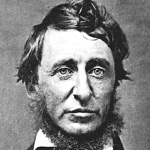
Henry David Thoreau
1817 – 1862 CE
Father of environmentalism and America's first yogi
Dedicated abolitionist, "America's first yogi," champion of nature and the natural, “father of environmentalism;” Thoreau brought a little Lao Tzu into 19th Century America. Instead of following in the pattern of his piers leading a life of “quiet desperation,” Thoreau followed much more in the Tao Te Ching’s style of Wu Wei. His non-violent approach to opposing slavery and the Mexican-American War inspired future leaders like Gandhi and Martin Luther King. Although one of America's most famous writers, during his lifetime his most famous book, Walden didn’t sell enough copies to pay for the paper it was printed on.
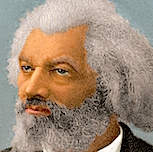
Frederick Douglass
1818 – 1895 CE
International symbol of social justice
Escaped slave, most influential 19th century black leader, adviser to Abraham Lincoln, champion of the working class, author, orator, and newspaper editor; Douglass eloquently agitated for the abolition of slavery, racism and capital punishment; for women’s rights, free public education, and land reform. Calling racism a “diseased imagination,” he convinced Lincoln to let blacks fight in the Civil War and helped enlist troops. Internationally famous, author of an American classic autobiography, a father of liberation theology, and the first African American in many political positions; his memory symbolizes and inspires the spirit of people everywhere to resist oppression and work for social justice.
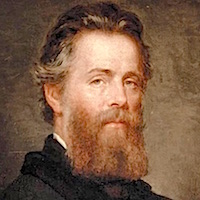
Herman Melville
1819 – 1891 CE
One of the best and most influential of all American writers but almost forgotten and unknown during the last 30 years of his life when he had to take a job as a Customs Inspector; Melville brought myth, scripture, philosophy, and mystical imagery to his haunting novels. Drawing on his adventurous ocean travels, he wrote Moby Dick which was a commercial failure and strongly criticized when first written but became a world classic described by D. H. Lawrence as "the greatest book of the sea ever written" and "one of the strangest and most wonderful books in the world.” Portraying the delicate dance between truth and illusion, the impossibility of deep and mutual communication, and the search for the absolute in the relative; his works gave a deep and powerful color to world literature.
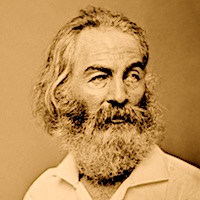
Walt Whitman
1819 – 1892 CE
Premier "poet of democracy" and model for Dracula
“Father of free verse,” one of the most influential American poets, humanist, journalist, Civil War volunteer nurse; Whitman blended realism and transcendentalism and became known as the first "poet of democracy.” His most famous work, Leaves of Grass, was called everything from "trashy, profane & obscene, the author a pretentious ass" to a work more central to American culture than Melville's Moby-Dick, Twain's Huckleberry Finn, and Emerson's The Conduct of Life. Vociferously criticized for being obscene with sexuality themes, it was admired by Thoreau, Ralph Waldo Emerson, Amos Bronson Alcott, and Oscar Wilde. Though biographers assert that Whitman was gay, he always denied it and claimed to have 6 illegitimate children. In a contrast between his poetry and personal views, he promoted equality and true democracy in the former, status quo views of nationalism and racism in the latter. His poetic and vagabond lifestyle inspired the Beat movement, Allen Ginsberg, Jack Kerouac, Gary Snyder, Lawrence Ferlinghetti, Bob Dylan, and Bram Stoker who used him as the model for his character, Dracula.

Florence Nightingale
1820 – 1910 CE
The founder of modern nursing, she started the first secular nursing school in the world, emphasized preventive medicine and holistic health, improved healthcare for all classes as well as hunger relief in India. She helped abolish harsh prostitution laws and expanded acceptable roles for women. A strong Christian, she was critical of organized religion, appreciated pagan and eastern religions, and strongly opposed discrimination of all kinds. She inspired worldwide health care reform and her work improved the situation for women everywhere. Her influence remains strong and the Florence Nightingale Declaration has been signed by over 18,500 nurses from 86 countries.
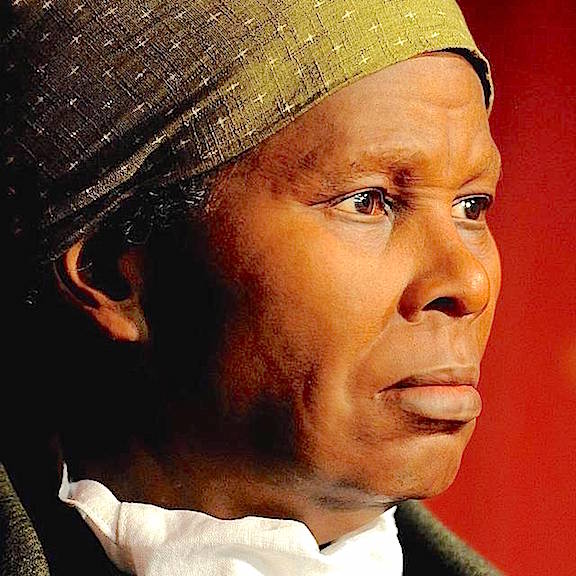
Harriet Tubman (Araminta Ross)
1822 – 1913 CE
Beaten, whipped, and escaped slave; US armed army spy, nurse and scout during the Civil War; and soon to replace on the $20 bill slave-owning Andrew Jackson who illegally broke treaties with native Americans and refused to support Supreme Court rulings in their favor; Tubman was the first woman to lead an armed war campaign (that freed 700+ slaves), used the Underground Railroad to secretly rescue over 70 slave families, found work for the newly freed slaves, and became an important part of the women's suffrage movement. A devout Christian considered by many a saint, although living in constant poverty, she never stopped her humanitarian work and is now a shining symbol for courage and freedom.
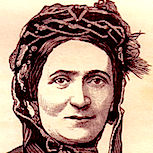
Ellen Craft
1826 – 1891 CE
A slave secretly married to a slave with a different master and fearing their forced separation, Ellen (at least ¾ European) cut her hair short and disguised herself as a white man traveling with his servant who was really her husband. The elaborate disguise included facial bandages and a sling so she wouldn’t have to sign papers since she couldn’t read or write. She had to act a different gender, race, and social class. After many days traveling by train and steamer they arrived safely in the north and then - fearing slave hunters - went on to England where they wrote a popular account that became an important influence for abolition. After the war, they returned to Georgia and started an agricultural school.
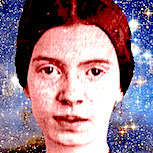
Emily Dickinson
1830 – 1886 CE
Though now considered one of the greatest figures in American literature and one of the most important poets, only a few of Dickson’s poems were published during her lifetime and those were significantly edited and changed by publishers. Her first collection wasn’t printed until years after her death and a complete collection wasn’t published until 1955. A serious student of botany, she made and maintained a vast collection of plants; highly introverted, creative, unique, and challenging the assumptions of her time; she seldom left her house but wrote 40 volumes of almost 1800 poems.

Mark Twain (Samuel Langhorne Clemens)
1835 – 1910 CE
America’s most famous author
Riverboat captain, adventurer, bankrupted businessman, inventor, and America’s most famous author; Mark Twain, with his wit, wisdom, insight, and humor influenced and continues to positively influence the world. A strong supporter of women's, religious, racial, and labor rights; he wrote scathing indictments on war, patriotic, and religious bigotry and published new work in 3 different centuries. Though disliked by his wife Livy, his book The Adventures of Huckleberry Finn ranks among history’s all time best. Ernest Hemingway said, ”All modern American literature comes from one book by Mark Twain called Huckleberry Finn.”
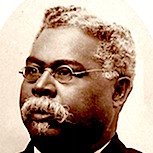
Robert Smalls
1839 – 1915 CE
In a dramatic escape from slavery, Smalls commandeered a Confederate steamer during the Civil War, disguised himself in the captain’s coat, picked up the families of his fellow slave sailors, and made a mad dash for a Union blockade where they were welcomed as heroes. He later helped recruit over 5000 blacks to help in the North’s war effort, served as a captain in the US Navy. After the war he returned to South Carolina, bought his former master’s house, served in the US House of Representatives, founded the Republican Party of South Carolina, and authored the state legislation that gave his state the first US free and compulsory public school system.
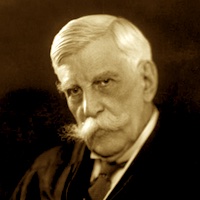
Oliver Wendell Holmes Jr.
1841 – 1935 CE
Game-changing Supreme Court Justice
One of America’s most respected and influential judges of all time, Holmes still holds the record for the oldest Supreme Court Justice. His family was close friends with Henry James Sr. and Ralph Waldo Emerson; he became close friends with William James and Henry James Jr. His often-cited, penetrating comments supported civil liberty, freedom of speech, and progressive, democratic ideals. His legal opinions formed the foundation for Roosevelt’s New Deal.
His book, The Common Law (still in print after more than 140 years), remains a source for heated debates. Opposing attitudes based on opinions about any kind of absolute truth, it describes law as an evolving process based on the changing attitudes and insights of society.
Appointed to the Supreme Court by President Theodore Roosevelt, he became one of the greatest judges but disappointed and alienated Roosevelt when he ruled against an anti-trust case particularly close to him. He approved trade unions and their ability to organize and strike, supported eugenics laws, and earned a reputation as 'The Great Dissenter.'
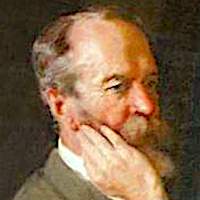
William James
1842 – 1910 CE
"Father of American psychology”
"Father of American psychology,” and one of the most significant American philosophers; William James established the philosophical school called pragmatism, functional psychology, and radical empiricism. His wealthy father wanted William and his brother Henry to be educated in a way free from dogma and goal-oriented career study. This led William into the fields of chemistry, physiology, anatomy, a medical degree, and a Harvard professorship where he set up the first American experimental psychology laboratory and became the first to offer a U. S. psychology course. Suffering through severe mental depression and serious health issues, he turned to philosophy and an evolved understanding of the self as a spiritual essence, a continual stream of consciousness much deeper and more meaningful than our material and social identifications.
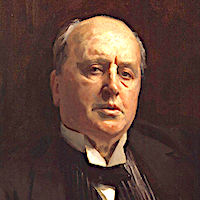
Henry James
1843 – 1916 CE
One of history’s greatest novelists, brother of William James, and 3-time Nobel Prize nominee; Henry James pioneered experimental literary techniques that deepened characters from overly simplistic caricatures to realistic depictions of ambiguity, paradox, and contradiction. Breaking from the romantic tradition of Charles Dickens, he experimented with literary styles and introduced more realism trying to involve readers more personally and influence them emotionally rather than just as distant and uninvolved observers. This attracted much criticism but also evolved literary styles to include more emphasis on psychological states of mind and the ability to inspire.
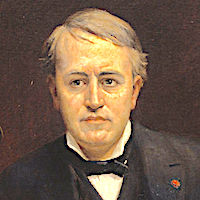
Thomas Edison
1847 – 1931 CE
America's greatest inventor
“America's greatest inventor,” businessman, and entrepreneur; Edison set up the world’s first industrial research laboratory, first film studio, and held in his name over 1,100 US and foreign patents in many fields including electric power, communications, and motion pictures (his film studio made almost 1,200 films.). Some of his most influential inventions include the light bulb, phonograph, motion picture camera, the fluoroscope, the tasimeter, and the nickel-iron-battery. Henry Ford was a neighbor and employee who Edison helped with his business ventures. A victim of nepotistic seductions, Edison had to take his son to court for using their family name to promote scams, snake-oil products, and fraudulent ventures. He joined Blavatsky’s Theosophical Society, became a strict vegetarian, and promoted nonviolence.
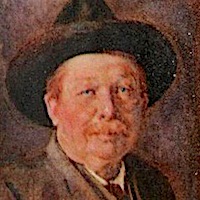
Joel Chandler Harris
1848 – 1908 CE
An outsider born out of wedlock and abandoned by his father, Harris saw the world from two points of view: from the privileged White and from the disadvantaged, under trodden but soulful Black. This led to a dual career: Joe Harris as journalist supporting racial reconciliation and North-South reconciliation as well as the Joel Chandler Harris who wrote 29 books and brought the oral African-American 'Brer Rabbit' stories and more racial respect into the mainstream culture. During the civil war, he worked for a Confederate loyalist on a plantation; but, because of his illegitimacy and red hair, felt more comfortable with the slaves and spent almost all his free time with them. His use of dialect revolutionized literature and was a major influence on Mark Twain, Kipling, A.A. Milne, Beatrix Potter, Faulkner, Ezra Pound, T.S. Eliot, and James Joyce.

Paul Carus
1852 – 1919 CE
The Teachings of Lao Tzu
Self-described as “an atheist who loved God,” Paul Carus was one of the first Americans with a serious interest in Buddhism. He saw Taoism and Buddhism as complementary and published 75 books and 1500 articles on social issues, history, science, religion, politics, logic, anthropology and mathematics. He worked closely with D. T. Suzuki and corresponded with thought-leaders of his time like Tolstoy Thomas Edison, Nikola Tesla, and Booker T. Washington. He defined his philosophy as, “everything is fraught with life; it contains life; it has the ability to live” and promoted a “Religion of Science,” interfaith dialog, and a “cosmic religion of universal truth.”
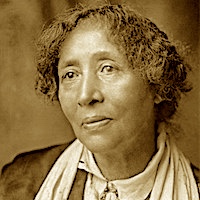
Lucy Parsons (Eldine Gonzalez)
1853 – 1942 CE
Political activist “more dangerous than a thousand rioters”
Born a slave to Native-American/African-American/Mexican-American parents; Lucy became a powerful orator, American radical activist, founder of the Industrial Workers of the World, and labor union organizer. She married a newspaper editor and former Confederate soldier—Albert Parsons—but had to quickly leave Texas because of interracial prejudice. In Chicago they became involved in the labor movement and helped organize a peaceful rally striking for an eight-hour day. An unknown person threw dynamite at police but several organizers including Albert were blamed and executed. This became a galvanizing event on the entire world’s labor movements as well as inspiring Lucy and an active life into her 80’s described by police as, “more dangerous than a thousand rioters.”
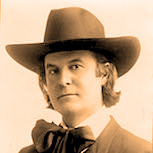
Elbert Hubbard
1856 – 1915 CE
Traveling soap company salesman who invented the “leave on trial” technique, philosopher, artist, trouble-maker and writer; Hubbard identified with the Thoreau, Whitman, Tolstoy lineage and distilled this philosophy in his famous essay, A Message to Garcia. Often mocked for "selling out,” convicted for circulating "obscene" material but pardoned by Woodrow Wilson; he seemed to live his famous adage, “When life gives you lemons, make lemonade.” He blended philosophy and business, idealism and practicality stretching into the wisdom beyond words. Survivor of the Titanic sinking, he died along with his wife in stoic acceptance on a different ship sunk by a German submarine.
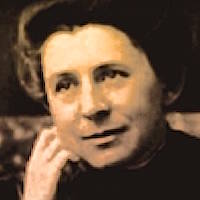
Ida Tarbell
1857 – 1944 CE
Journalist, author, teacher, and leading authority on Abraham Lincoln; Ida Tarbell invented a new kind of reporting now called investigative journalism. She developed new techniques like researching public documents scattered across the country and then, based on this research, interviewing executives, academics experts, and government regulators. With a little help from Mark Twain, she applied these new methods to an exposé on the Standard Oil Company and John D. Rockefeller who she described as viciously money-grabbing, miserly, and harming the country with his monopolizing of oil. This ushered in what’s now called the “the era of muckraking journalism,” brought down one of the world's worst tycoons, broke up the Standard Oil monopoly, and inspired a play with 686 continuous performances setting the record for any New York play.
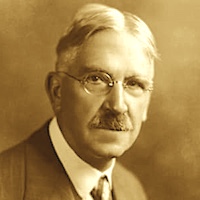
John Dewey
1859 – 1952 CE
The "Second Confucius"
American philosopher, psychologist, one of the original 34 signatories of the first Humanist Manifesto, major voice for progressive education and academic freedom; Dewey is considered the “epitome of liberalism,” “one of the fathers of functional psychology,” leading proponent of hands-on learning, and a powerful advocate for democracy. Writing 40 books and over 700 articles in 140 journals, he helped establish the NAACP, supported immigrants, and the women’s suffrage movement. He worked closely with Albert Einstein, Bertrand Russell, Karl Jaspers, Henri Bergson, Martin Buber, and George Santayana; established a college where the faculty included Buckminster Fuller, Paul Goodman, and the Beat Generation "Black Mountain Poets.” One of his students, B.R. Ambedkar, became one of the founding fathers of independent India. President of the League for Industrial Democracy, he refuted the influential Walter Lippmann views on the need to manipulate democracy by using journalism as propaganda. He lived in China during 1919-1922 giving nearly 200 lectures to thousands Chinese audiences who described him as "Second Confucius.” Returning, he gave lectures in the USA discussing the teachings of Laozi.
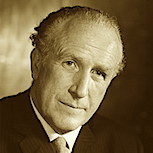
Arthur Desmond
1859 – 1929 CE
Arthur Desmond (c. 1859 – 1929), aka Arthur Uing, Ragnar Redbeard, Richard Thurland, Desmond Dilg, Gavin Gowrie
Bank-bashing heroic reformer, “The Poet of Revolution,” author, and politician; Desmond started a political organization dedicated to “emancipation from poverty, competitive commercialism, industrial wage slavery, tyrannical authority, and mental bondage." Like Machiavelli and his satirical book The Prince, Desmond was slandered by the rich and powerful plutocrats of his time as an immoral, satanic figure, advocating Social Darwinism, racism, and fascism. His book, Might Is Right, however, was called by fellow labor movement collaborators, “one of the greatest books ever written." He promoted land reform, the nationalization of large estates and banks, single taxation and called bank directors "scoundrels", large estate owners "blood-sucking leeches" and the local press as "hirelings of monopoly.”
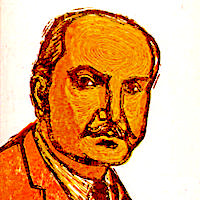
Santayana, George (Jorge Agustín Nicolás Ruiz de Santayana y Borrás)
1863 – 1952 CE
Powerfully influential, true-to-himself philosopher/poet
Poet first, philosopher second, novelist, Harvard dropped-out professor, Christian-atheist, free-thinking cultural critic; Santayana mixed his poetic genius with deep, philosophic insights; beauty with truth. Born in Spain, he brought an old European flavor and aristocratic appreciation to his new but temporary American homeland saturated with the idealism and individualism of Emerson and Thoreau. Many of his aphorisms have progressed from words of wisdom to cliché to truism. ("Those who cannot remember the past are condemned to repeat it") Professor to students like T. S. Eliot, Robert Frost, Gertrude Stein, Walter Lippmann, W. E. B. Du Bois, Conrad Aiken, and Supreme Court Justice Felix Frankfurter; major influence on thought-leaders like Bertrand Russell and Alfred North Whitehead; Santayana’s influence on awakened evolution continues
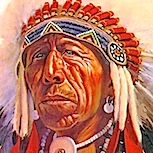
Black Elk (Heȟáka Sápa)
1863 – 1950 CE
Holy Sioux Medicine Man, Heyoka (sacred clown), wounded warrior, seer of wisdom-visions; Black Elk was spiritual but pragmatic - he became Catholic because “My children had to live in this world,” but later told his daughter, “The only thing I really believe is the pipe religion.” He went to England with Buffalo Bill's Wild West show in 1887, got lost, and traveled through Germany, France, and Italy where he saw that “The Holy Land is everywhere,” and returned with insight that inspired both the American Indian Movement and some of the best elements within European-American culture: civil rights, organic farming, renewable energy, sustainable living, and the environmental movement.
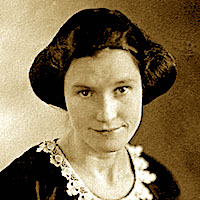
Edith Hamilton
1867 – 1963 CE
Historian, professor, translator, mythologist, and classicist; Edith Hamilton wrote insightful, best-selling books on mythology, Greek, and Roman culture. Her younger sister became the first woman on the faculty at Harvard University and Edith received Greece's highest honor, the Golden Cross. John F. Kennedy consulted with her and Robert F. Kennedy quoted her in his speeches. An educator most of her life in change of the only private US high school for women that prepared all of its students for college, she began her second career as an author publishing her first book, The Greek Way, when she was sixty-two. A biographer, her life was "ruled by a passionately nonconformist vision.. her strength and vitality, her appeal as public figure and author."
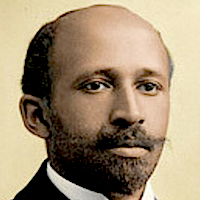
W. E. B. Du Bois
1868 – 1963 CE
W. E. B. Du Bois, William Edward Burghardt (1868 – 1963)
First African American to earn a doctorate (Harvard), co-founder of the NAACP, historian, peace activist,sociologist, and civil rights activist for minorities world-wide; Du Bois led the Niagara Movement which insisted on equal rights rather than accepting Southern white proposals that traded Black political freedoms for economic and educational opportunities. He protested against the commonly accepted lynchings of his time, wrote a foundational set of African-American essays, and one of the first scientific works in the new field of sociology. Blaming capitalism for causing racism, he proposed and promoted many issues that became law in the US Civil Rights Act, criticized American churches for being primary supports of discrimination, and worked hard for nuclear disarmament.
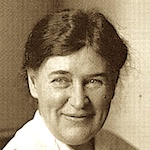
Willa Cather
1873 – 1948 CE
Modern day Lao Tzu
Wonderful novelist with a flare for evoking a deep appreciation for nature and the natural world, Willa Cather championed the values of self-sufficiency, independence, and harmony with nature. Nostalgic for the time when most people lived on farms, she used “the rising and setting of the sun” as a major theme and honored the struggle of exiled immigrants. Infusing meaningfulness and sacred outlook into simple, daily tasks she unknowingly continued the Zen spirit and understanding Lao Tzu wrote about so much longer before.
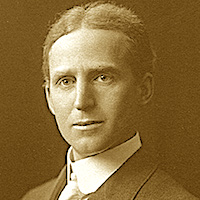
Charles Beard (Austin)
1874 – 1948 CE
Pioneering progressive historian
Historian, professor, and progressive political pioneer; Beard questioned the philosophical motivations of the U.S. founding fathers and described their more influential economic motivations. This view became both highly influential and strongly criticized. He supported US involvement in World War I but opposed it during and after World War II criticizing FDR (although he supported the New Deal) for lying to the American people and tricking them into supporting the war. He thought of the Constitution as a "counter-revolution" established by the rich to prevent an excess of democracy. This became the accepted historical interpretation until it lost favor of the status quo about 1950 but remained influential to less status quo conforming historians.

Will Rogers
1879 – 1935 CE
One of the most famous and popular, internationally recognized Native American personalities, "Oklahoma's Favorite Son,” humorist, radio and movie star, columnist, and penetrating social commentator; Will Rogers made 71 movies, traveled around the world 3 times, and wrote more than 4000 national newspaper articles. The highest paid movie star of his time and most respected political commentator, he came from a small farm in Cherokee Nation Indian Territory and set an example for Native Americans integrating into White culture and becoming successful without selling out and abandoning their heritage. Wise, kind, and humorous; he teased politicians, gangsters, and ordinary people’s confused convictions influencing them all into better ways.

Albert Einstein
1879 – 1955 CE
Although he made his name synonymous with genius as the father of modern physics and his E = mc2 became ”the world's most famous equation,” Einstein remained humble and unassuming. Although winning a Nobel Prize and writing over 30,000 documents, he didn’t let himself be seduced by fame and fortune but championed civil rights, non-violence, and - like Chuang Tzu and other famous Taoists - refused political honors including becoming the president of Israel. He worked hard for checking the power of nation states with a democratic global government, believed in a pantheistic god, and as an avid violin player said, “I often think in music.”
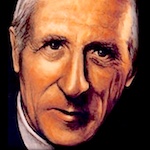
Teilhard de Chardin
1881 – 1955 CE
Philosopher, geologist, Jesuit priest and paleontologist, Chardin traveled extensively across China and helped discover Peking Man. Although frequently condemned and censored by church officials and his writings banned, later popes, cardinals and theologians praised him and his ideas. Similarly reviled and revered by scientists and described as everything from a “charlatan” to “one of the century’s most prophetic thinkers,” his life manifested the cutting edge of consciousness evolution he described so clearly.
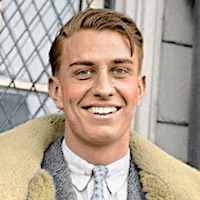
Franklin Roosevelt (FDR)
1882 – 1945 CE
Champion and creator of a more just and equitable society
32nd president of the United States, winner of a record 4 terms, widely considered one of the 3 greatest presidents and one of the of the 20th century's most influential politicians, and champion of the New Deal; Roosevelt met and successfully responded to some of the USA's most challenging problems including the Great Depression, Prohibition, and World War II. He helped establish the United Nations, Social Security, a minimum wage, and made child labor illegal. Like all of us though—in particular politicians—he has a shadow/dark side which manifested in the incarceration of Japanese-Americans during WWII, a subtle support for white supremacy, and a tremendous expansion of presidential powers.

William Carlos Williams
1883 – 1963 CE
Life-long physician, pediatrician, friend to Ezra Pound; Williams worked as a doctor by day, as a writer by night, merged poetry with painting, imagery with modernism. His literary experimentalism working to create a new art form was so radical it was even criticized by radical experimentalists. Overshadowed by the timing and work of T.S. Eliot, Williams abandoned and criticized this intellectual style favoring instead American colloquial English writing an epic poem of place about Paterson, NJ. Mentor to the Beat Poets and in particular Allen Ginsberg, he won the first National Book Award for Poetry, the Gold Medal for Poetry, and posthumously the Pulitzer Prize.

Kahlil Gibran
1883 – 1931 CE
After Shakespeare and Laozi, Gibran is the third best-selling poet of all time. His friends included WB Yeats, Carl Jung and Auguste Rodin. Elvis Presley was deeply influenced by Gibran, read passages to his mother, made notes in the margins, and gave away copies of The Prophet to his friends. Johnny Cash was also a big fan and John Lennon adapted lines from his poetry into his songs.
{Maronite Christian, Bahá’í, Sufi}
The Prophet, Sand and Foam, The Earth Gods, The Broken Wings, Love Letters in the Sand.
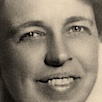
Eleanor Roosevelt
1884 – 1962 CE
Longest-serving First Lady in the history of the United States, Eleanor was mentor and guiding influence behind her powerful and famous husband, blending his charisma with her wisdom. Though a terrified introvert, she was the first First Lady to be on talk radio, address a national convention, hold a press conference, write a newspaper column and averaged 150 lectures a year throughout the 50’s. She championed civil rights, women’s rights, helped write the Universal Declaration of Human Rights and became chairperson of the UN Commission on Human Rights. Called the “First Lady of the World” by Harry Truman, she received thirty-five honorary degrees and two of her speeches are on the Top 100 Speeches of the 20th Century.

Will Durant
1885 – 1981 CE
Philosophy apostle and popularizer of history's lessons
Apostle for philosophy, Catholic priest vocation drop-out, socialist reporter, librarian, professor who quit so he could marry his much younger 15 year-old student who became his 68-year married wife; Durant became not just an ivory-tower intellectual and academic but someone who put the lessons of history into practical lessons useful for average people. He worked for women’s right to vote, equal wages, better working conditions for American labor, and wrote a "Declaration of Interdependence,” that was read into the Congressional Record and started a movement against racial intolerance 10 years before the Civil Rights Movement. Writing “the most successful historiographical series in history,” and awarded a Pulitzer Prize for literature as well as the Presidential Medal of Freedom, he critiqued the West’s “fatal error of perspective:” Eurocentrism, intolerance and provincialism.
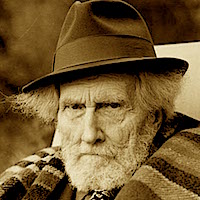
Ezra Pound
1885 – 1972 CE
Major influence on modern poetry, developer of Imagism, critic of international capitalism to the extent of supporting Hitler and Mussolini; Pound helped to discover, animate, and promote literary figures including Ernest Hemingway, T. S. Eliot, James Joyce, and Robert Frost. The depth and genius of his writing was tarnished by his political views and actions which resulted in being convicted of treason, solitary confinement and probably torture in a US military prison that caused a mental breakdown and 12 years of incarceration in a Washington, D.C. psychiatric hospital. Considered by Arthur Miller “worse than Hitler” and called a "National Monster" by many; Hemingway wrote that his writing “will last as long as there is any literature" and Carl Sandburg that "All talk on modern poetry, by people who know, ends with dragging in Ezra Pound somewhere.” In later life he confessed to his Jewish protege Allen Ginsberg his confused belief in ideologies and that, “Any good I've done has been spoiled by bad intentions […] But the worst mistake I made was that stupid, suburban prejudice of anti-semitism.” Although sages warn against flattery and recommend welcoming criticism, Pound’s anti-semitism and support for fascism make it extremely difficult although increasingly important to openly hear his valid criticisms of our culture and state of civilization. The smartest people learn from smart people’s mistakes.
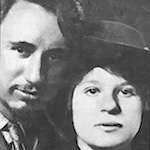
Will (and Ariel) Durant
1885 – 1981 CE
Much more than ivory-tower, intellectual academics, Will and Ariel Durant worked to put the lessons of history into practical lessons useful for average people. He worked for women’s right to vote, equal wages, better working conditions for American labor, and wrote a “Declaration of Interdependence,” that was read into the Congressional Record and started a movement against racial intolerance 10 years before the Civil Rights Movement. Writing “the most successful historiographical series in history,” and awarded a Pulitzer Prize for literature as well as the Presidential Medal of Freedom, he critiqued the West’s “fatal error of perspective:” Eurocentrism, intolerance and provincialism.
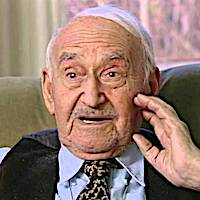
George Seldes
1890 – 1995 CE
Pioneering investigative journalist and champion of the exposé
Star investigative reporter, muckraker, contrary-minded journalist, author, philosopher, and true citizen of the world; George Seldes lived a 104-year life full of adventure in dangerous countries, political challenge on the edge, and philosophical insight threatening the status quo. There and reporting on Hitler’s Berlin, Lenin’s Moscow, Mussolini’s Rome, and Franco conquering Spain; he was often characterized as too radical. Criticized and censored by newspapers, foreign and U.S. governments; one of his censored interviews with the supreme commander of the German Army could have prevented the rise of Nazi power before World War II. Expelled from the Soviet Union after interviewing Lenin and “not showing enough respect,” and from Italy after he implicated Mussolini (who had worked for Seldes before gaining power) in the murder of an opposition leader; he wrote exposés on the Roman Catholic Church, the global arms industry, and the complicity of the press with the tobacco industry in suppressing information on the bad effects of smoking. Toward the end of his life, he spent 20 years gardening and gathering material for a book of the world’s most influential thoughts.
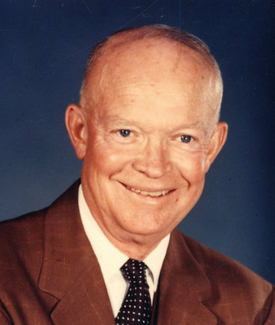
Dwight D. Eisenhower
1890 – 1969 CE
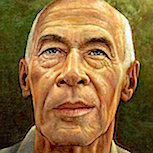
Henry Miller
1891 – 1980 CE
Banished from the UK, literary bohemian in 1930’s Paris, painter of over 2,000 watercolors, author of over 50 books (many banned for a generation), anti-Vietnam War voice, “one of the most iconoclastic literary spirits of our time,” legendary lover from Anaïs Nin to Playboy magazine star Brenda Venus when he was 84 years old; he pioneered new literary forms, attacked respectability, broke cultural taboos, and in one of the main events in 1960’s sexual revolution, won a Supreme Court decision on obscenity. Continuing a tradition from Dostoyevsky, Balzac and Nietzsche; he was an important influence on Jack Kerouac, Philip Roth, Alan Ginsberg and Norman Mailer who called him “the writer’s writer.”
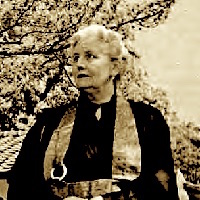
Ruth Fuller Sasaki
1892 – 1967 CE
First foreigner to become a priest in a Japanese Rinzai Zen temple, only woman yet to be a Daitoku-ji temple priest, and pioneering welcomer of Buddhism into the USA; Sasaki was an early student of yoga and Eastern philosophy during the 1920’s. She translated herself and—supervising a team including Gary Snyder—initiated many of the first translations of important Zen texts into English. Student of D. T. Suzuki, mother-in-law to Alan Watts, married to Zen master Sokei-an; she created places for people to practice, provided texts, and helped open the door for most of the early American Zen practitioners.

Pearl Buck
1892 – 1973 CE
Growing up and living in China as the daughter and wife of Christian missionaries, Pearl Buck described their arrogance and manipulation arguing against the benefit of missionaries and an institutional church. Denounced in China during the cultural revolution and prevented from visiting with Richard Nixon, she wrote 60+ books, won a Pulitzer, and became the first American woman to win the Nobel Prize for Literature. Long before they became popular or safe positions, she publicly challenged gender and racial discrimination while founding the first interracial and international adoption agency that placed over 5000 “unadoptable” children.
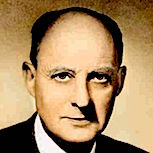
Reinhold Niebuhr
1892 – 1971 CE
Composer of the Alcoholics Anonymous Serenity Prayer, author of a nonfiction book ranked in the top 20 of the twentieth century, "the most influential American theologian of the 20th century,” leading political and cultural commentator for over 30 years; Niebuhr challenged religious conservatives as narrow-minded, religious liberals as naive and taught a middle-way “Christian realism.” Barack Obama’s "favorite philosopher" and a deep influence on Thomas Edison, Jimmy Carter, Martin Luther King Jr., John McCain, and given the Presidential Medal of Freedom by Lyndon Johnson; one of his books was called, "the most important book ever written on U.S. foreign policy.”
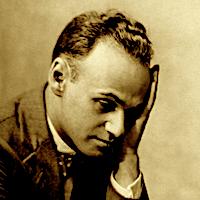
Gilbert Seldes
1893 – 1970 CE
Maker of the first full-length documentary film
Producer, author, critic, director, editor, and educator; Seldes created an immeasurable impact on Western Civilization with his insightful critiques and comments on popular American culture, cultural democracy, and popular history. The first CBS News television director, he pioneered innovative approaches to media and entertainment, hosted popular TV shows, created the the first full-length documentary film; wrote, directed and produced many educational programs. He praised Ernest Hemingway but only earned his disdain; strongly criticized F. Scott Fitzgerald's work but remained close friends. He helped legitimize popular entertainment but called soap operas 'corrupting influences’. An influential advocate for fairness and balance in reporting, his efforts delayed but unfortunately could not prevent the rise of propaganda-TV like Fox News.
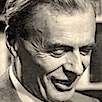
Aldous Huxley
1894 – 1963 CE
With deep insight and keen intelligence, Aldous Huxley for decades using almost every form of media to provide a penetrating commentary on contemporary civilization. Described as “the prophet of the 20th century,” he was nominated for the Nobel Prize in Literature 7 times. He brought into spotlight a vivid image of both the unconscious dark and potential brightness of our evolving technology, social, and political forms animating the dangers of consumption, conformity, technology dependence, indulgence, and pleasure-seeking as well as the potential of the perennial philosophy, finding deep meaning, understanding the sense and not just the words, experiencing the sacredness of each moment.
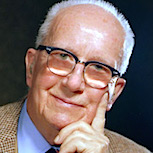
Buckminster Fuller
1895 – 1983 CE
“One of the greatest minds of our times," pioneering solution-solver doing "more with less,” poet, engineering and inventor-genius with 25 patents; Bucky developed a comprehensive and practical perspective on ways to solve world problems. Expelled from Harvard in 1913 and also in 1915 (he later received 47 honorary doctorate degrees) and on the verge of suicide in 1927 when his construction company failed, he went into a 2-year reclusive retreat emerging as one of our greatest global thinkers. His inventions include a winch to rescue boats, a way to better produce concrete buildings, the World Game, the Dymaxion™ house, car, bathroom, grain bin, and many as well as the geodesic dome with now more than 300,000 in use everywhere from African villages to remote radar stations to children’s playgrounds. Advocate of "a one-town world,” seeing ourselves on "spaceship earth,” and the world as one living system; he inspired tens of thousands of sustainability pioneers.
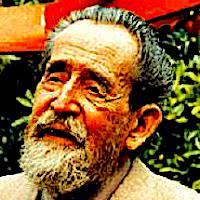
Dane Rudhyar ( Daniel Chennevière)
1895 – 1985 CE
Agent of cultural evolution
Modernist composer, transcendental artist, science fiction writer, philosopher, and founder of transpersonal astrology; Rudhyar thought of himself as a “seed” spreading a new era of cultural evolution. Prolifically creative his entire life, scholars consider his most fruitful period beginning when he was 74. During the next 10 years, he published several books a year including many insightful works on planetary consciousness. After performing one of the first original polytonal orchestral pieces in the United States, he met a Zen teacher and began studying Eastern philosophy. This led to an emersion in Theosophy, Jungian psychology, humanistic astrology, and the New Age movement. Living and teaching in 1960’s San Francisco, he became a major influence on the counter culture. He helped transmute much of the time’s superstitious allurements into symbolic interpretations and psychological insights.

Krishnamurti (Jiddu Krishnamurti)
1895 – 1986 CE
Born into a poor family with 11 children and a mother who died when he was 10, chosen and groomed by the Theosophical Society when he was 14 years old to become the new “World Teacher,” a messianic Maitreya and Cosmic Christ figure; Krishnamurti was showered with financial resources, reverence, publicity and followers. When still young, he renounced this role of guru and mystical belief system, disbanded the organization, and launched a teaching career that emphasized psychological rather than external revolution; going beyond philosophy, nationality, caste, religion; the sense over the words; and freedom from all social, political, or religious conceptual prisons.
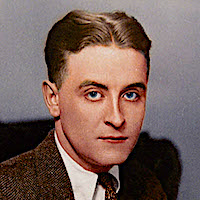
F. Scott Fitzgerald
1896 – 1940 CE
Prototype of "Jazz Age" exuberance
One of the greatest American writers, prototype of "Jazz Age" exuberance, and symbol of the "Lost Generation"; Fitzgerald became popular and successful during his lifetime but not respected in the literary world until after his death. His passion for writing interfered with his college pursuits and he had to drop out of Princeton and join the army where he became a student of Dwight Eisenhower whom he passionately disliked. During this time he met his future wife, Zelda Sayre who was the daughter of a state Supreme Court justice but she wouldn't marry him until his first novel became famous and he finally had an income steady enough to support her opulent lifestyle. Her later mental illness, his alcoholism, health and financial problems plagued his later years and he died from a heat attack when only 44.
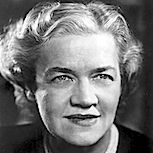
Margaret Chase Smith
1897 – 1995 CE
Called by Khrushchev "the devil in disguise of a woman,” Chase was the first woman to serve in both houses of the US Congress, as chair of the Senate Republican Conference, and the first to be placed in nomination for the presidency. Though an independent Republican, she deeply respected John Kennedy, voted against Nixon proposals, and led the opposition against demagogue Joe McCarthy. She strongly supported civil rights, Medicare, increased educational funding, and the NASA administrator said without here they wouldn’t have been able to land a man on the Moon.
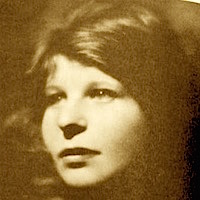
Ariel Durant (Chaya Kaufman)
1898 – 1981 CE
Brilliant conversationalist, champion of women’s rights, student, lover, wife, muse, and equal to Will Durant; Ariel emigrated with her mother to America from the Ukraine when 3 and grew up on the New York streets learning to fight and take care of herself. Will married her when she was 15 and he was 28 and her teacher. They spent the next 68 years together on an intellectual, contemplative, and literary journey writing The Story of Civilization and many other books and articles. Named "Woman of the Year,” she shared a Pulitzer Prize and the Presidential Medal of Freedom with her husband. Constantly introducing him to radical artists, poets, and free-spirits from Greenwich Village to Woodstock, she balanced Will’s pedantic, scholastic personality with love-of-life adventurism. Although running away several times during the early days of their marriage, they came to represent the depths of close relationship, the joining of the two halves of the complete being described by Plato, and the possibilities for marriage.
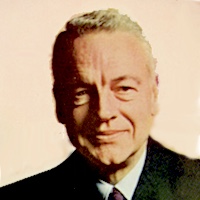
Robert Hutchins (Robert Maynard Hutchins)
1899 – 1977 CE
An educational philosopher whose time has arrived; Robert Maynard Hutchins was University of Chicago president, Yale Law School dean, Editor In Chief of the Great Books of the Western World, and a leading proponent of secular perennialism—nonspecialized and nonvocational
education based on discovering the “sense” rather than relying on just the words, on principles not just facts. Encouraging deeper understanding, prioritizing thinking for ourselves, and attacking superficial focus on entertainment and the narrow “trade school” approach to education; he eliminated varsity football at the University of Chicago and implemented novel educational programs based on the Great Books and Socratic dialogue. In later life he ran the Ford Foundation and channeled huge sums into programs for adult education, to train teachers, and to spread liberal arts. One of these became PBS.
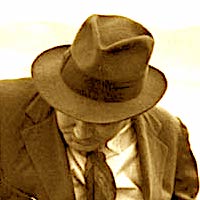
Thomas Wolfe (Thomas Clayton Wolfe)
1900 – 1938 CE
Father of autobiographical fiction
North Carolina's most famous writer, father of innovative autobiographical fiction, novelist, playwright, and major influence on the Beat Generation writers; Wolfe lived a short but creatively influential life. His famous novel, Look Homeward, Angel included more than 200 thinly disguised references to family and friends in his hometown of Asheville, NC. Their outrage to this book basically exiled him for 8+ years but their equally negative response to his next book was caused by them not being included. William Faulkner called him the greatest talent of their generation, Jack Kerouac idolized him, Ray Bradbury was so impressed he included Wolfe as a character in one of his books, Prince of Tides author Pat Conroy credited him with sparking his writing career, and Hunter S. Thompson thanked him for his famous phrase "Fear and Loathing".
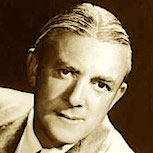
James Hilton
1900 – 1954 CE
Writer of the first paperback novel (PocketBooks #1 said to have started the "paperback revolution"), Academy Award winner, author of 22 books, and creator of the now famous "Shangri-La;” Hilton imagined, populated, and launched into our cultural consciousness his depiction of a happy and enlightened group living in a remote, secret, almost inaccessible, and secret land protecting the best of culture during a dark age. Many cultures have similar myths but his was so powerful Franklin D. Roosevelt used it as name for the presidential retreat now called Camp David and China recently renamed an entire mountain region after it. Many of his characters exemplified a deep wisdom and appreciation for doubt over belief.
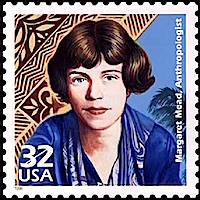
Margaret Mead
1901 – 1978 CE
Cultural anthropologist, creator and exemplar of the Jewish mother stereotype, feminist movement cornerstone, husband of Gregory Bateson, mother of Mary Catherine Bateson; Margaret challenged prevailing views about race and intelligence, about traditional sexual mores, about the false identifications that seemingly separate human unity by fixating on visible but insignificant cultural displays. Her work significantly advanced the evolution of a one-world vision and the importance of us all becoming “citizens of the world.” President Jimmy Carter awarded her the Presidential Medal of Freedom in 1979.
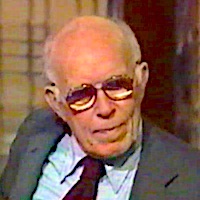
René Dubos
1901 – 1982 CE
Influential scientific environmentalist
Microbiologist, leading humanist and influential environmentalist; Dubos wrote 32 books including a Pulitzer Prize winner. Creator of the famous phrase, "Think Globally, Act Locally," he empowered and entrusted individuals, local, and small organizations making needed changes rather than relying only on large, impersonal, and out-of-touch institutions. He argued that only local, small-scale organizations can clearly see and respond to their "unique physical, climatic, and cultural contexts." He balanced this sentiment, however, with an emphasis on need for communication with a world order conscious of environmental priorities. While not ignoring our immense global challenges, he conveys an optimistic, positive, and realistic approach.
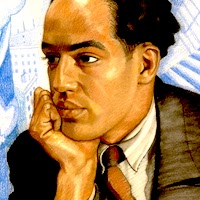
Langston Hughes
1901 – 1967 CE
Pioneering elevator of Black culture
Social activist, people's poet, author, and journalist; Langston Hughes innovated “jazz poetry,” pioneered the cultural renaissance now called “when Harlem was in vogue,” and helped establish the first department of African-American studies. Dramatically representing American culture, both of his paternal great-grandmothers were slaves and both of his paternal great-grandfathers were slave owners. Some of his other ancestors were Native Americans, Speaker of the House Henry Clay, a Jewish slave trader, and white abolitionists. A classmate of Thurgood Marshall and friend of MLK, he challenged racial stereotypes, protested negative social conditions, and elevated African American self-image in the US and around the world. Martin Luther King carefully channeled Hughes’ poems.
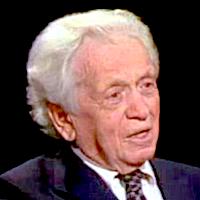
Max Lerner (Maxwell Alan)
1902 – 1992 CE
Journalist, professor, humanist, and controversial cultural commentator; Lerner supported Roosevelt’s New deal, fought against racial discrimination, and gained a high place on Nixon’s hate list. He mainly supported progressive causes but went along with the internment of Japanese Americans during World War II and backed Ronald Reagan. Untied to unthinking political dogma, he was considered a controversial liberal during the 50’s and 60’s but more conservative during the 80’s. A close friend of Elizabeth Taylor, he worked on antiwar efforts, taught at Harvard, Sarah Lawrence, Wellesley, Brandeis, and wrote for the New York Post, the New Republic, The Atlantic, Saturday Review, and many other publications. He applied his dedication to personal responsibility in a struggle with lymphatic cancer which he won and described in a book, Wrestling with the Angel.

John Fire Lame Deer
1903 – 1976 CE
Native Americans have a unique perspective on White, American culture. While not sharing the same values and assumptions, they still live surrounded by this foreign way of life. This makes their commentaries and critiques both more accurate and more personal than those based on a more distant point of view. Lame Deer exemplifies this perspective in a vivid and articulate style – his words are well worth taking to heart.
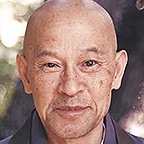
Shunryu Suzuki Roshi
1904 – 1971 CE
In completely in harmony with Lao Tzu, Suzuki Roshi’s teachings, possibly more than almost anyone else – and without saying so – brought a clear understanding of the Tao Te Ching into our modern world. In Japan, he had to deal with the rigidity and aggressiveness of his war time country. He came to San Francisco in 1959 and flourished during the height of the counter-culture influencing poets, artists, religious leaders (like Alan Watts and Chogyam Trungpa), and founded the first Zen Buddhist monastery in the West.
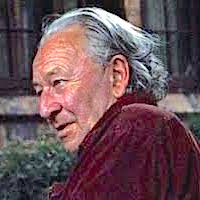
Gregory Bateson
1904 – 1980 CE
Poet-philosopher, deep thinker, anthropologist, and developer of a "meta-science;” Bateson established double-bind theory, helped apply systems theory to the social science, and was part of the core group that developed cybernetics. While married to Margaret Mead, he worked in South Pacific islands on anthropology and during World War II on black propaganda which led to a marriage-fatal disagreement with his wife on the use of science and technology in social planning. Describing 20th century history as a malfunctioning relationship based on betrayal and hate, he posed the development of cybernetics as a direction toward the creation of healthy relationships through the healing of paradox and the non-dual combination of thought and emotion.
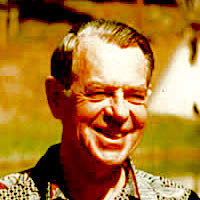
Joseph Campbell
1904 – 1987 CE
Great translator of ancient myth into modern symbols
In his prime, one the fastest half-mile runners in the world, voracious reader, 38-year Sarah Lawrence College professor; Joseph Campbell became a world-expert on mythology and comparative religion. He in part survived the Great Depression by reading 9-12 hours a day. Inspired by Krishnamurti, close friend of John Steinbeck and nutritionist Adelle Davis; he translated and interpreted our ancient and more modern mythologies into language understandable to most people. George Lucas read Campbell’s books and used his ideas in creating the Star Wars and Indiana Jones movies. They were also used in the making of Disney's Lion King, the Matrix, the Batman series, Watership Down, and the Dan Brown books.
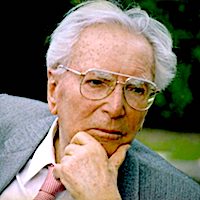
Viktor Frankl
1905 – 1997 CE
Brave and insightful concentration camp survivor
A survivor of multiple Nazi concentration camps that claimed the lives of his mother, wife, and brother; Frankl developed a psychological approach—logotherapy—based on vivid personal experiences rather than hypothetical theories. He watched how people’s ability to survive in the most horrendous situations correlated with the degree of meaningfulness they could discover as well as seeing how this mirrored his own ability to live through and survive this almost unimaginable suffering. Before his concentration camp experiences he had already focused his work on depression and suicide which successfully prevented even one Viennese student suicide in 1931. After the war, he became an important inspiration for the humanistic psychology movement, wrote 39 books translated into 49 languages, received 29 honorary Ph.D. degrees and taught in locations all over the world. He convincingly debunked the still prevalent deception of finding happiness in relaxation, vacations, and retirement; and pointed instead toward the struggles of meeting challenges, working toward goals, and—most importantly—projects that make the world a better place.
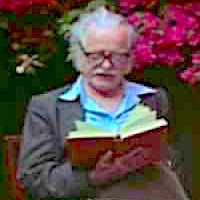
Kenneth Rexroth
1905 – 1982 CE
"Father of the Beats”
A philosophical anarchist, "Father of the Beats,” translator, Chinese scholar and translator; Rexroth introduced Allen Ginsberg to Gary Snyder, mentored Lawrence Ferlinghetti and testified on his behalf in his obscenity trial for publishing Ginsberg’s book, Howl. He appeared as a character in Kerouac’s book Dharma Bums and wrote the article on Literature for the Encyclopedia Britannica. A UC lecturer famously popular with students but cringingly infamous with administrators because of his inflammatory critiques of campus culture, he was a pacifist and conscientious objector during World War II while devotedly helping interred Japanese-Americans. His philosophy condensed into a view of society and culture as a “social lie” maintained to preserve the rich and powerful’s ability to exploit the majority
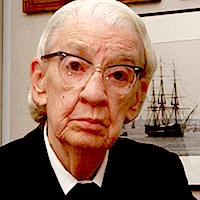
Grace Hopper (Grace Brewster Murray Hopper )
1906 – 1992 CE
Computer programming pioneer "Grandma COBOL,” US Navy admiral nicknamed "Amazing Grace,” IT goodwill ambassador, and recipient of 40 honorary university degrees; Hopper balanced a disciplined and conventional external with a fiercely independent, irreverent, and creative inner force. Her work and belief that computer code could be written in English led to the development of the early programming language, COBOL that’s still in use today. One of the oldest active duty officers in the US Navy’s history, she served for over 42 years and received the National Medal of Technology, the Presidential Medal of Freedom, and numerous awards and honors. While her team was working on an early computer in 1947, they discovered a problem caused by a moth in a relay. This was the physical source of the symbolic term, "debugging."
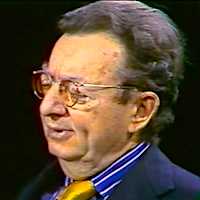
I. F. Stone
1907 – 1989 CE
One of the greatest 20th century reporters
Investigative journalist, author and political commentator; Stone's newsletter was ranked 2nd highest 20th century journalism publications and 16th on top 100 U.S. journalist works. He became a strong and influential voice against McCarthyism, the Vietnam War, and racism in the military. He graduated high school 49th in a class of only 52 students but during that time launched a 65+ year journalist career investigating corruption and exposing how "All governments lie."
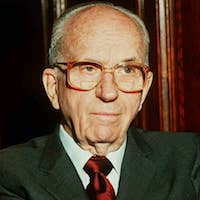
James Michener
1907 – 1997 CE
Historical and Generational Saga Master
Inspired storyteller of the human spirit, Michener created some of our most memorable fictional characters. Often writing for 12-15 hours a day for weeks and weeks, he created books that became best-sellers, movies, Broadway musicals, TV series, and a Pulitzer Prize winner. Because these books were so carefully researched, they became one of the more popular ways of learning about certain historical periods and peoples.
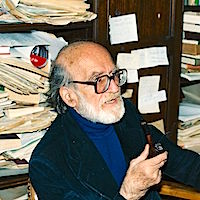
Mircea Eliade
1907 – 1986 CE
Theologian of the Sacred, philosopher, professor, historian of religion, journalist who “never read newspapers,” and novel writer; Eliade became one of the most influential interpreters of religious experience. As a very conservative youth, he supported far right ideologies; but, during his later life, this support shifted toward the non-Marxist Left and the hippie youth movement. Although an admirer of Gandhi and non-violence, he was accused of antisemitism and support of fascism. He was identified with far-right politics but fired from a University position because of an attack by the far-right press. His theories and descriptions of religious experience (in particular hierophanies and the “Eternal Return”) established paradigms for religious studies still accepted today.
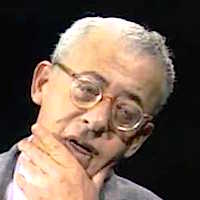
Saul Alinsky
1909 – 1972 CE
Saul Alinsky (1909 – 1972)
“Founder of modern community organizing,” “creator of a backyard revolution in cities across America,” champion of the poor and powerless; Alinsky became a strong influence on Cesar Chavez, Hillary Clinton, Barack Obama and Dolores Huerta but his methods and strategies were also studied and used by Tea Party organizers. Dedicating his own work to improving the living conditions in poor communities, he was active in the labor movement, poverty alleviation across the USA, in black ghettos, and California barrios. Reviled and banned by establishment politicians but admired and imitated by counterculture-era organizers; he was described by William F. Buckley Jr. as an “organizational genius,” by Adlai Stevenson as “a most faithfully reflect[ion] our ideals of brotherhood, tolerance, charity and dignity of the individual,” and according to Time magazine he “altered democracy.”

E. F. Schumacher
1911 – 1977 CE
The “People's Economist”
While working in Burma during the mid ‘50s, Schumacher developed a set of principles he called “buddhist economics” — emphasizing the idea that people need good work for proper human development. Traveling through many Third World countries, he helped governments create self-reliant economies based on local resources and needs. A pioneer and instigator in creating a philosophy of “appropriate technology,” and known as the “People's Economist,” his economic theory based on wisdom instead of only materialism, became one of the most serious alternatives to the dominant economic theories based on Adam Smith and John Maynard Keynes.
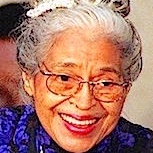
Rosa Parks
1913 – 2005 CE
Symbol of the Civil Rights Movement, an international icon of resistance to racial segregation. and called by the US Congress “the mother of the freedom movement;” Rosa Parks sparked the the Montgomery Bus Boycott and as a result was fired from her job and received death threats for years. She dedicated her life to advancing social issues, donated most of the money from her almost constant speaking engagements, and although given the Presidential Medal of Freedom, the Congressional Gold Medal, numerous awards; she lived a very simple, poor and private life and was even evicted from her apartment in 2002. The subject of many books, films, and songs; her legacy continues to inspire efforts toward equality everywhere.
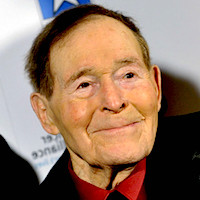
Jack LaLanne
1914 – 2011 CE
Jack LaLanne (1914 – 2011)
"Godfather of Fitness,” the "First Fitness Superhero,” pioneering champion of physical health and nutrition; Jack LaLanne practiced and proved what he preached. “Turning his life around” at 15 after learning about good nutrition, ending his sugar and junk food addiction, and beginning to work out every day; he began hosting the longest-running television program, a fitness show that lasted 34 years. He opened one of the world’s first fitness gyms in 1936 and invented many exercise machines still used today. In spite of doctors warning their patients about visiting his health club, most people ridiculing his diet, and calling him a health nut charlatan: LaLanne persevered demonstrating the truth of his words by at age age 45 doing 1,000 jumping jacks and 1,000 chin-ups in 1 hour, 22 minutes; at age 60 swimming from Alcatraz Island to Fisherman's Wharf while towing a 1,000 pound boat; at age 70 handcuffed, shackled, and fighting strong winds and currents, towing 70 rowboats for 1 mile; and at age 96 the day before he died completing his regular 2-hour work out.
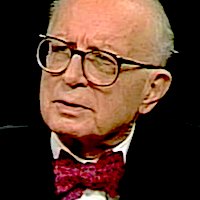
Daniel J. Boorstin
1914 – 2004 CE
American intellectual Paul Revere
“An intellectual Paul Revere,” American historian, US Congressional Librarian, Rhodes Scholar, and Pulitzer Prize winner; Boorstin became a Communist Party member when young, a prominent conservative in later life. Promoting the "consensus school" of history, he praised entrepreneurs and inventors, criticized conformity, bureaucracy, slavery to tradition, and an historical emphasis on class conflict. On a parallel track with Marshall McLuhan he praised, analyzed, and warned about the unintended consequences and social upheaval that inevitably arises from new technology. With self-effacing insight, he looked deeply into American culture both praising and criticizing aspects of this unprecedented historical experiment.
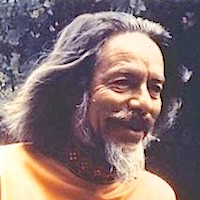
Alan Watts
1915 – 1973 CE
Episcopal priest become Buddhist, trickster, "philosophical entertainer,” counterculture hero, gifted speaker, and transducer to the West of Eastern philosophy; Watts wrote more than 25 books and in 1953 began a 9-year series of weekly radio broadcasts that continue being re-broadcast today. A friend and collaborator with Gary Snyder and Joseph Campbell, an inspiration for Robert Anton Wilson and Werner Erhard; Watts was criticized by teachers like Philip Kapleau, D. T. Suzuki, and Robert Baker Aitken but defended and described as a “great bodhisattva” by Shunryu Suzuki. Equating mystical experience with ecological awareness and Buddhism with psychotherapy, Watts became a bridge between culture and nature criticizing the modern view of “progress,” the idea of an absolute morality, and the ego-centricism preventing individual and international peace.
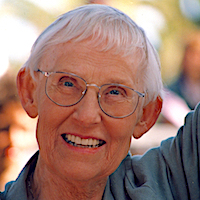
Charlotte Joko Beck
1917 – 2011 CE
Authentic, pioneering Western Zen master
Piano teacher, secretary, mother of four, and one of the first Western Zen teachers; Charlotte Joko Beck didn't begin Buddhist practice until her 40's but it quickly became her life. Her first teacher was Taizan Maezumi Roshi but she left him amid scandals involved with him sleeping with students. She also studied with Hakuun Yasutani and Soen Nakagawa. She emphasized the synergy between Buddhism and psychology as well as the practical, emotional reality of our lives. She stopped shaving her head and wearing robes, and helped American Zen evolve beyond the walls of Japanese culture.
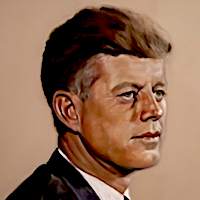
John Kennedy
1917 – 1963 CE
Modern America's most popular president
Journalist, politician, and one of the most respected US presidents of all time; Kennedy inspired a generation and holds the highest presidential average approval rating of 70%—the highest of any president in Gallup's entire history of measuring job approval. He is the only Roman Catholic ever elected president, the youngest person to be elected president, and the second-youngest to serve as president. His book Profiles in Courage, written during his years in the Senate, won a Pulitzer Prize. He established the Peace Corps, supported the civil rights movement, proposed the Civil Rights and the Revenue Acts that were passed after his assassination. He approved the failed Bay of Pigs Invasion but rejected Operation Northwoods, a Joint Chiefs plan to fabricate a false attack to get public support for a war against Cuba as well as successfully navigating the Cuban Missile Crisis. He increased the US presence in Vietnam but—according to Defense Secretary McNama—was strongly considering pulling the US completely out: a position his successor, Lyndon Johnson strongly disagreed with. He began a program called the "New Frontier" to provide federal funding for education, free elderly medical care, aid for poor rural areas, and the ending of racial discrimination; but, these efforts were cut short when he was killed by Lee Harvey Oswald.
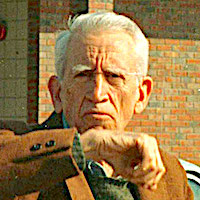
J. D. Salinger
1919 – 2010 CE
Something about the writings of J. D. Salinger captured the imagination of the 1950's and 60's and continues on today. He helped bring into Western culture more of an appreciation for authenticity, genuineness, and the idea of being true to oneself. His life intersected with and influenced many famous people of his time. He dated playwright Eugene O'Neill's daughter (who left him to marry Charlie Chaplin), socialized with actresses like Anne Bancroft and Audrey Hepburn, and studied with spiritual teachers like D. T. Suzuki. He became a serious Zen student, studied Lao Tzu, Sufi mysticism, yoga, and Vedanta. Authors who cite him as a major influence include Haruki Murakami, John Updike, Philip Roth, Louis Sachar, Tom Robbins, and many more. After a brief experience with fame, Salinger returned to his Lao Tzu-influenced roots of inscrutable privacy and anonymity.
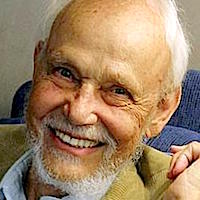
Huston Smith
1919 – 2016 CE
Born in Suzhou, Huston Smith lived there with his Christian missionary parents until 17 when he moved to the USA where he became not only a religious scholar but a practitioner of his Christian tradition as well as Vedanta, Sufism, and Zen Buddhism for more than 10 years each. A close student of Aldous Huxley, he became an integral part of the Harvard Project and the Center for Personality Research working with Timothy Leary and Ram Das. When the Supreme Court ruled against Native Americans using peyote as a religious sacrament, he took up the cause and helped pass the American Indian Religious Freedom Act amendment. In the 1950s, he helped Martin Luther King break the color barrier at a segregated University and later helped the Dalai Lama come to the USA for the first time. Lifelong advocate of religious synergy, social justice and peace; his work blended theology, mythology, and science.
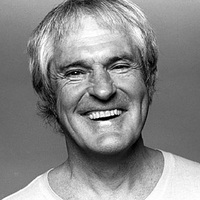
Timothy Leary
1920 – 1996 CE
Pioneering psychonaut, performing philosopher, and counter-cultural hero
Harvard professor, "performing philosopher,” counter-culture hero, consciousness explorer, and famous psychonaut; Timothy Leary personified the rebel archetype from an early age. He was court-martialed from West Point for refusing to inform on fellow cadets, expelled from the University of Alabama for spending a night in the female dorm, fired from his professorship at Harvard for allegedly missing classes, and during the 60’s and 70’s was imprisoned in 36 different prisons worldwide. President Richard Nixon described him as "the most dangerous man in America.” In 1960, he teamed up with fellow Harvard professor, Richard Alpert (Ram Dass) to launch the first scientific psilocybin research project; and later, with Allen Ginsberg began a campaign to introduce psychedelics and the discovery of higher levels of consciousness to the broader culture. He pioneered research into the benefits of psychedelics in curing alcoholism, inducing religious experiences, and reforming criminals (dropping recidivism rates rates from 60 to just 20%). He won a supreme court marijuana case and—with the support of John Lennon and Yoko Ono—ran for governor of California (Come Together was a Lennon-written campaign song). An early influence on Game Theory, Transactional Analysis, Aldous Huxley, Robert Anton Wilson, and Huston Smith; Leary became a major influence on modern psychology but also created a back-lash that effectively ended psychedelic research until its revival in modern times.
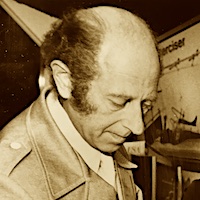
Ralph Alan Dale
1920 – 2006 CE
Translator, author, visionary
(1920-2006)
Conductor, composer, clinician, acupuncturist, researcher and prolific writer of over 70 books and videos; Dale translated the Tao Te Ching into verse and wrote a deeply thought-through chapter-by-chapter commentary applying Lao Tzu's wisdom to modern day challenges. In his profession, his writing, and in his life; he seems to both understand the deeper Tao Te Ching messages as well as develop insightful ways of incorporating this wisdom into solutions for modern political, cultural, and social challenges. While not minimizing modern confusions, he stays positive and optimistic, predicts new evolutionary cultural realizations, the actualization of Taoist visions of wholeness and harmony.
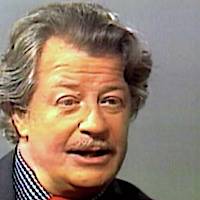
James Clavell
1921 – 1994 CE
Fictionalizing and fictional historian
Thought of as mainly a novelist but at heart an historian with a story-tellers flare for the dramatic, Clavell romanticized history and made it entertaining. Commentators describe Plato as more of a fictional, literature author than an historian; and, in a similar way, Clavell could be deemed more of a historian than a fiction writer. He appears in his novels as Peter Marlowe, a prisoner of war in King Rat, a novelist in Noble House, and a friend in Whirlwind. The non-fictional foundations of his books describe Japanese prison camp life in King Rat, William Adams—the first of a tiny number of Westerns to become a samurai—in Shogun, Jardine Matheson—founding father of one of the first Hong Kong trading companies and now one of the world’s largest companies, and in Whirlwind, the 1979 Iranian revolution in Iran. Also a filmmaker, his credits include The Fly in 1958, To Sir with Love and The Great Escape in the 1960’s, and many popular TV miniseries based on his books.
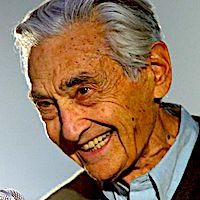
Howard Zinn
1922 – 2010 CE
Historian of the oppressed and defeated
Educational innovator, historian, author of 20+ books, and democratic socialist; Zinn grew up in a family of factory workers who couldn’t afford to buy books or magazines. In a dramatic and life-molding event, when young and participating in a peaceful political rally, he was knocked unconscious by mounted policing charging on the protestors. During the Vietnam War, he supported Vietnam Veterans against the War, the Civil Rights and Labor Movements. He backed the Native American, Black, and Women’s equality efforts, opposed the 2003 invasion of Iraq, and the extensive military bombing of civilian targets. Realizing the omni-influence of the phrase, “History is written by the victors,” he worked hard to popularize the stories of the morally superior but physically defeated historical groups. The success of these efforts could be measured by the identities and allegiances of his major critics: Republican Indiana Governor Mitch Daniels tried to keep his book out of state schools, because of his support for Martin Luther King, the FBI added him to their Security Index and label him a high security risk, and—even as recently as 2017—an Arkansas legislator tried to ban his books from public schools.
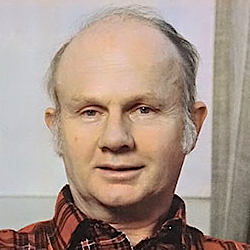
John Holt
1923 – 1985 CE
John Holt (1923-1985)
Excellent teacher for 14 years fired for advocating children’s rights, author of the“Homeschooling Bible,” Teach Your Own, visiting lecturer at U. C. Berkeley and Harvard Graduate School, school system consultant; John Holt came to believe that the US school systems were failing and becoming only places "where children learn to be stupid,” focus on avoiding ridicule rather than learning, become only “teacher-pleasers, and lose their love of discovery. He blamed grades, tests, and ranking students for undermining their confidence, inspiration, and joy; and advocated “unschooling” as a kind of Lao Tzu-ian Wu Wei, natural approach to opening the doors of enthusiasm, freedom, and creativity.
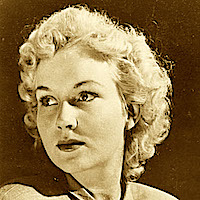
Carolyn Cassady
1923 – 2013 CE
Formal artist at 9 years old selling her first painting at 14, award winning set designer and head of make-up at 16, author, “grande dame of the Beat Generation,” founding member of the Academy of Parapsychology and Medicine, mother of 3 Neal Cassady children, and Jack Keroac love partner; Carolyn Cassady later regretted but divorced Neal launching him into further travels with Ken Kesey's band of Merry Pranksters (described in Electric Koolaid Acid Test) and his death in Mexico. Student of Erich Fromm, Dane Rudhyar, Edgar Cayce, and Peter Drucker; symbol in On the Road for integrity and goodness; muse for and character in the writings of Kerouac, Tom Wolfe, John Clellon Holmes, and Ken Kesey; portrayed by Kirsten Dunst and Sissy Spacek in movies; she took care of their children by herself when Neal spent 2 years in jail for a tiny amount of marijuana and worked to prevent young people from following in the self-destructive, Beat-imitating misunderstandings.

Reb Zalman
1924 – 2014 CE
Major founder and proponent of the Jewish Renewal movement and writer of the first English book on Jewish meditation; Rabbi Zalman when young was interned in Vichy French detention camps and escaped the Nazi advance in Europe by coming to America. In 1962 after experimenting with LSD, he left his more conservative tradition and became a voice in the counter-culture movement championing feminism, the Gaia hypothesis, and a kind of mystical pantheism. Recognized as a sheikh (wise elder) by a Sufi order, given an honorary doctorate by a Unitarian school of ministry, and World Wisdom Chair at the Buddhist Naropa University; he was an important voice in deep ecumenical dialogues
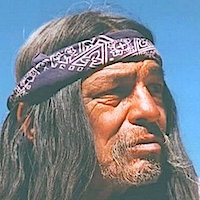
Carlos Castaneda
1925 – 1998 CE
An anthropology graduate student from Peru going to UCLA, Castaneda's first two books were dissertations for degrees and the first one ended with lots of academic jargon which he soon apologized about. His 12 books took on an increasingly symbolic tone and the reception changed from historical belief to conviction that they were complete fiction. This perception did little to decrease their popularity and they sold more than 28 million copies and were translated into 17 languages. Factual or not, they inspired a different way of looking at culture, value systems, and perception - one in harmony with our wisdom beyond words theme.

Allen Ginsberg
1926 – 1997 CE
Eloquent instigator, figurehead and voice for the Beat Generation of the ’50s, the counterculture of the 60’s and the flowering of Buddhism in America during the 70’s and 80’s; Ginsberg symbolized a powerful influence against materialism, the military-industrial complex, and conformity. His poem "Howl” written during a time when homosexuality was a crime in every U.S. state was confiscated by police, seized by US Customs, and started a famous obscenity trial that led to more legal and cultural acceptance for the LGBT community. For decades, a powerful advocate for free speech, gay rights, and non-conformity; a tireless opponent and protestor against the Viet Nam War, the War on Drugs, imperialism, the failure to protect refugees, and persecution of minorities; at the request of his Tibetan teacher Chögyam Trungpa and along with Anne Waldman started The Jack Kerouac School of Disembodied Poetics.
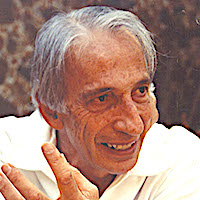
Ivan Illich
1926 – 2002 CE
"an archaeologist of ideas"
Philosophical eco-warrior, Roman Catholic priest, anarchist, polymath, "jet-age ascetic," and prolific author; Illich—working in 10 languages—critically analyzed Western culture—economics, medicine, education, transportation, development, work and energy. After becoming a priest in 1951, he signed up to work in one of New York's poorest areas with Puerto Rican immigrants. This led to a University appointment in Puerto Rico that lasted until he was fired for being too critical of the pope's anti-birth control stance. His later life became an enlivening educational experience for all within his influence.
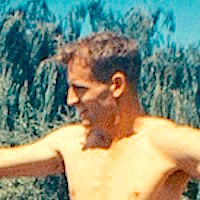
Neal Cassady
1926 – 1968 CE
Beat Generation generator, one of the most significant literary and pop-culture figures of the 20th century, the most famous Colorado native, pioneering stream-of-consciousness writer, reason for Kerouac and Ginsberg moving to Denver, (in)famous lover, inspiration for Bob Dylan and much of the 1960’s soundtrack; Neal Cassady is a little-known but deep influence on the best of today’s culture. Homeless son of an itinerant, alcoholic barber; stealer of more cars than any other person in Colorado’s history (500+ between ages 14 to 21); Cassady is immortalized in Grateful Dead songs, as Dean Moriarty in Kerouac’s On the Road, Cody Pomeray in Dharma Bums, the mad driver of Further in Wolfe’s Electric Kool-Aid Acid Test and most likely Randle McMurphy in Ken Kesey's novel, One Flew Over the Cuckoo's Nest.
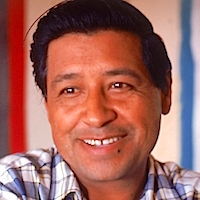
César Chavez César Estrada Chávez (César Estrada Chávez)
1927 – 1993 CE
Iconic "folk saint,” Mexican-American farm laborer, civil rights activist, grass roots organizer, co-founder of the the United Farm Workers union; Cesar Chavez used nonviolent but spirited methods to further the rights and living standards of farm workers. Nominated 3 times for the Nobel Peace Prize, given the Presidential Medal of Freedom, and inducted into the California Hall of Fame; he promoted and practiced non-violence, vegetarianism, and Hispanic empowerment helping to establish collective bargaining for farmworkers.
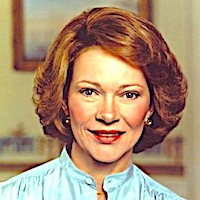
Rosalynn Carter
1927 – 1923 CE
Insightful and compassionate politician
Oldest living First Lady, author of 5 books, strong supporter of equal rights, and active member of the Carter administration; Rosalynn Carter disdained the role of traditional First Lady and was criticized by members of her own party who believed “women are meant to be kept at home and that's all." Instead, she broke the molds confining presidents’ wives to being only official hostesses. For only the second time in history for a First Lady, she appeared before Congress to testify, in this case for a new Mental Health System bill. A strong voice against Ronald Regan who she believed was ruining the country, she promoted peace in Israel, human rights in Brazil, help for refugees from Pol Pot, and Habitat for Humanity. Not afraid to disagree with her husband on policy issues, she actively disagreed and argued with him during his time as president and up to recent times disagreeing with him about Russian interference in the 2016 election.

Noam Chomsky
1928 CE –
A Jew now banned from Israel but awarded World Peace awards for the promotion of human rights; vilified by corporate interests and the mainstream press but given honorary degrees from over 50 colleges and universities; arrested multiple times for his political activism but one of the single most cited scholars in academic circles; on Nixon's Enemies List and illegally watched by the CIA for many years but considered by progressives “a figure of enlightenment and inspiration;” called by the far right “a hard-boiled anti-American monomaniac” but a foundational pioneer in the fields of cognitive science, linguistic theory, computer science, and evolutionary psychology; Chomsky may be the most important intellectuals alive today.
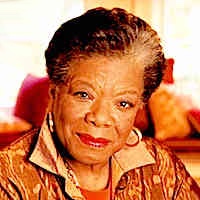
Maya Angelou
1928 – 2014 CE
From a background that included working as a nightclub dancer, fry cook and sex worker; Angelou climbed to becoming the first poet to recite for a Presidential inauguration since Robert Frost. She worked directly with Martin Luther King Jr., Malcolm X, and other Civil Rights leaders, received 50+ honorary degrees, dozens of literary awards, and the Presidential Medal of Freedom. An important spokesperson for women and black people, her books are both subject to bans in libraries as well as being extensively used in universities around the world. “America's most visible black woman autobiographer,” her books and poetry both defended and appreciated Black culture, became a powerful influence on modern hip-hop music, and helped further gender and racial understanding.
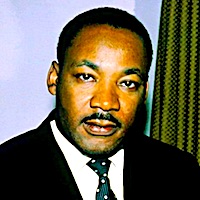
Martin Luther King Jr.
1929 – 1968 CE
Leading world influence for equality, peace, non-violence, and poverty alleviation
(1929–1968)
Baptist minister, one the the 20th century’s most admired people, “the conscience of his generation,” most famous civil rights leader, and known for one of history’s most influential speeches; Martin Luther King became one of the world’s most effective forces for equality, peace, and poverty alleviation. An enemy of J. Edgar Hoover, investigated by the FBI, and assassinated; his life proved the power and unstoppability of a good and pure heart. Practicing Gandhian nonviolence and Thoreauvian civil disobedience, he won the Nobel Peace Prize, the Presidential Medal of Freedom, the Congressional Gold Medal, 50 honorary university degrees; and today, a national holiday and hundreds of US streets are named in his honor.
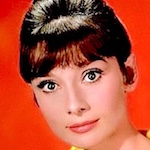
Audrey Hepburn
1929 – 1993 CE
She wasn’t that beautiful really, not sexy, an okay actress but not exceptional; what made Audrey Hepburn so popular was her deep goodness as a person. A wise and thoughtful humanitarian, she was active in the Dutch resistance during World War II, nominated for 7 Academy Awards, won twice and is one of only a few people who won Academy, Emmy, Grammy, and Tony Awards. She became the Goodwill Ambassador of UNICEF and devoted years working in some of the poorest communities of Africa, South America and Asia. Her movies continue to uplift, inspire, and improve the lives of millions of people.
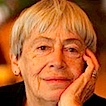
Ursula Le Guin
1929 – 2018 CE
At an early age, Le Guin saw her father making notes in an old book. In this way she discovered Lao Tzu who became a lifelong teacher and companion. Her father, a famous cultural anthropologist also exposed her to the native American shamanistic traditions. This led to a prolific and influential literary career with works translated into 31 languages and winning 21 Locus, 6 Nebula, 5 Hugo, a Newbery and World Fantasy, many “year's best” and other awards. Not just entertaining, these books challenged and positively shaped modern views on race, gender, society and the environment.
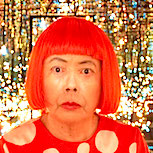
Yayoi Kusama 草間 彌生
1929 CE –
Yayoi Kusama 草間 彌生 (1929 - )
One of the Top 10 Living Artists, 2014’s most popular artist of the year, precursor and inspiration to Andy Warhol and the pop art movement, film writer/start, published novelist and poet named the most popular living artist; almost 90-year-old Yayoi Kusama set a record for a female artist when one of her works sold at Christie’s in New York for $5.1 million. During the counterculture’s 1960s, she organized a series of events that included naked, brightly painted withpolka dots participants. One of the world’s most important voices for the avant-garde, she has lived in a Japanese mental institution since 1973 creating hallucination-inspired “infinity nets” while organizing some of the world’s most popular art exhibitions. After creating art every day for over 70 years, she says she’s feeling “as creative as ever,” that “my mind is full of paintings,” and “I, Kusama, am the modern Alice in Wonderland.”
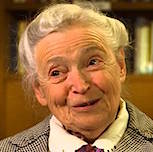
Mildred Dresselhaus (“the Queen of Carbon”)
1930 – 2017 CE
Growing up impoverished in a dangerous, multiracial neighborhood where teachers in the schools spent most of their time disciplining with little time for teaching; Dresselhausbecame M.I.T.’s first woman full professor, organized their first Women’s Forum, worked hard to encourage more women in science, and now 22% of M.I.T.’s faculty are women. Winning numerous awards including the Presidential Medal of Freedom and a pioneering researcher into the many uses of “buckyball” carbon atoms, she wrote over 1700 scientific papers, co-wrote 8 scientific books, helped discover many new scientific advancements including her research that developed the nonotube - something as strong as steel but one 10,000th the width of a human hair.

Oren Lyons
1930 CE –
Seneca and Iroquois Nations Council of Chiefs Faithkeeper, legendary athlete inducted into the Lacrosse Hall of Fame, artist, author, and international peace keeper; Oren Lyons’ life work expanded from promoting his own tribes’ welfare to indigenous lifeways and Native American Rights in general to human rights and economic development for indigenous people all over the world including working for Maori rights in New Zealand, yearly meetings in Geneva for the UN Human Rights Commission, and UNESCO’s World Conference Against Racism. A strong voice for the environment, sustainable development, a more sane world, and for the sacred over materialism; he represents native peoples in many forums throughout the world.

Gesshin Myoko Roshi
1931 – 1999 CE
Moon heart miraculous light
Rinzai Zen master as a girl known by Adolf Hitler who thought she was the perfect Aryan but whose family escaped to California; Gesshin Myoko (moon heart miraculous light) studied and taught Japanese and Vietnamese Zen. Painter, poet, calligrapher, and mystic from an early age; she led a life filled with spontaneous intuition and insight that led to meeting Sasaki Rōshi, becoming his disciple, helping him start thriving Zen centers, and becoming the head teacher. She later felt this approach was too severe and not appropriate for western students and developed her own Zen forms not tied to a particular culture, tradition or time period; but instead, connected with the particular students and environment involved.
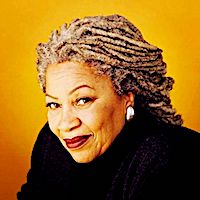
Toni Morrison (Chloe Ardelia Wofford)
1931 – 2019 CE
Story-telling voice of American wisdom
Novelist, professor, and essayist; Toni Morrison became Random House's first black woman editor. She consistently and insightfully addressed issues like race, feminism, white supremacy, and politics without fixating on extremes and while always keeping on open view. She won the Nobel Prize in Literature, the Pulitzer, the National Book Critics Circle Award, the American Book Award, and she was chosen for the Jefferson Lecture—the U.S. government's highest honor for accomplishment in the humanities. President Barack Obama presented her with the Presidential Medal of Freedom
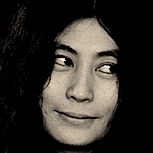
Yoko Ono 小野 洋子 (“Ocean Child”)
1933 CE –
The daughter of one of Japan’s richest banking clans in a long lineage of samurai warrior scholars; Yoko One fell from attending exclusive schools in New York and Japan to begging for food with all the family possessions in a wheelbarrow. A true, faithful life-artist, she collaborated with John Lennon’s public protests against the Viet Nam war, co-wrote ”Give Peace a Chance” inspired many famous songs, and was the only woman to sing a lead vocal on a Beatles’ recording. Continuing her life as “the world's most famous unknown artist,” she’s extended John Lennon’s legacy of political and social activism, philanthropy, and influence on world culture.
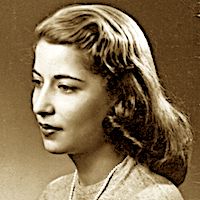
Ruth Bader Ginsburg
1933 – 2020 CE
Fierce and influential voice for justice, equality, and women's rights
Second female Supreme Court Justice, professor, "pop culture icon,” champion of gender equality and women's rights; Ginsburg became a fierce and influential voice on the direction of US law. The first Justice to officiate a same sex-wedding, her work led to ending gender discrimination in many areas and extended the Constitution’s Equal Protection Clause to women. Without neglecting her Supreme Court work, she’s struggled through the death of a husband, heart surgery, colon. and pancreatic cancer. To stay healthy and continue her work, she found a personal trainer, started working out, and at 80 could still do 20 full push-ups. Named one of the world’s 100 Most Powerful Women in 2009, “Women of the Year” in 2012, and one of Time’s “100 most influential people” in 2015; her influence continues.
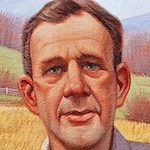
Wendell Berry
1934 CE –
Defender of small-farm values and sustainable agriculture, champion of appropriate technology and environmental causes, cultural conscience and effective critic of industrial farming, environmental degradation, and materialistic lifestyle; Berry’s prolific writing beginning with articles in the early 70’s for Rodale Press, Organic Gardening, and The New Farm and continuing through more than 50 books has inspired new generations willing to put place over ambition, sustainability over wealth, family and friends over fame, making the world a better place over power and prestige.
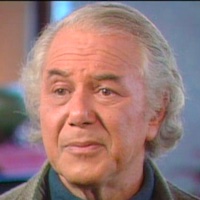
Jacob Needleman
1934 CE –
American religious scholar, historian, philosopher, and author
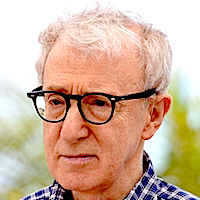
Woody Allen
1935 CE –
Woody Allen, Allan Stewart Konigsberg (1935 - )
Claustrophobic and agoraphobic “militant Freudian atheist,” stand-up comedian ranked third greatest of all time, musician, comedy writer, philosopher, filmmaker with 40+ films to his credit, playwright, and introspective social commentator; Woody Allen has maintained cultural relevance and survived the media spotlight for over 60 years winning 4 Academy Awards, 9 British Film Awards, and a motion picture voted highest on the Writers Guildlist of the "101 Funniest Screenplays." Known as an insecure, neurotic and intellectual nerd; he insists that those qualities are just another act and his real personality is quite different. Though controversial in many ways, he came up with some great quotes.
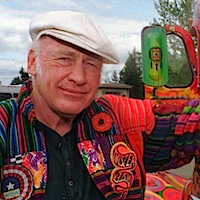
Ken Kesey
1935 – 2001 CE
Countercultural icon, Beat to Hippie era link, Grateful Dead mentor, and founder of the Merry Pranksters; Ken Kesey wrote one of the most influential books of the 20th century, One Flew Over the Cuckoo’s Nest. His life blended with his fiction and became a dramatic and entertaining story in itself as he explored the world of consciousness with the Merry Pranksters, evaded police trying to arrest him for marijuana possession, faked a suicide, went to jail, and finally settled down into a back-to-the-land lifestyle. A continual voice of authentic clarity; his essays, articles, and books brought insight and wisdom to the many cultural inequalities, dilemmas, and challenges of his time.
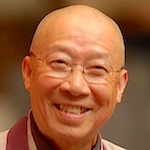
Jakusho Kwong
1935 CE –
Art teacher, postman, sign painter, Sonoma State University professor, and one of the first students of Shunryu Suzuki and Chogyam Trungpa; Kwong received official recognition as a Zen teacher from the Soto School in Japan and with his wife and dharma partner, Laura (Shinko) founded Sonoma Mountain Zen Center where they raised 4 sons and brought genuine Zen understanding to numerous students. After giving Richard Baker Dharma transmission the previous year, Suzuki Roshi’s was preparing the same for Kwong Roshi when he died in 1971.
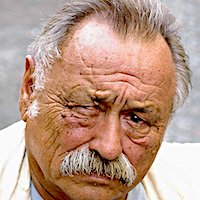
Jim Harrison
1937 – 2016 CE
"untrammeled renegade genius”
Called "an untrammeled renegade genius,” an "American literary icon,” and “a force of nature;” Harrison brought his deep poetic sense to a plethora of novels. An advocate for the benefits of a rural lifestyle, he lived most of his life on a farm in Michigan near where he was born. Most well known for his novels and screenplays like Legend of the Fall, much closer to his heart was his 12+ collections of poetry. Said to have looked like a brick layer, a beer salesman, or a sumo wrestler; he continued the Lao Tzuian, small-is-beautiful lineage of Han Shan, Henry David Thoreau, Willa Cather, and E. F. Schumacher. The superficial details of his life belie the depth of his experience, insight, and wisdom.
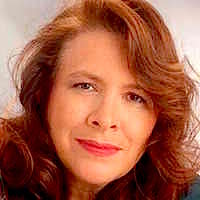
Jean Houston
1937 CE –
Visionary thinker, philosopher, scholar, historian, and author of 26 books; Jean Houston was trained by Teilhard de Chardin, Eleanor Roosevelt, as well as her father who was Bob Hope’s main comedy writer for 35 years, She’s an active consultant to leaders of 25 countries, worked with the United Nations and UNICEF in more than 100 countries, and helped Hillary Clinton write her book, It Takes a Village. She participated in LSD research before it became illegal and is considered one of the main founders of the Human Potential movement. Her friend and mentor Margaret Mead lived with her the last few years before she died and another lifelong friend, Buckminster Fuller said her “mind should be considered a national treasure.”
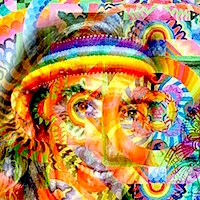
José Argüelles
1939 – 2011 CE
Author, artist, co-originators of the Earth Day events, main organizer of the Harmonic Convergence (the first globally synchronized meditation event), founder of the first Whole Earth Festival in 1970 that continues today, and inventor of the perpetual Dreamspell calendar; Arguelles promoted pluralistic syncretism. Blending ancient and modern wisdom traditions, he tried to inspire the best in people, culture, and politics. Deeply influence by astrologers like Dane Rudhyar and spiritual teachers like Chogyam Trungpa, he worked to promote Teilhard de Chardin’s concept of the noosphere and envisioned a "rainbow bridge" encircling the Earth.
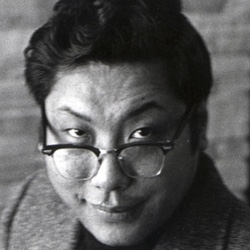
Chögyam Trungpa
1939 – 1987 CE
A once-in-a-generation kind of teacher, a mahasiddha for our times, a transducer transforming ancient wisdom into modern idiom. Per Allen Ginsberg, “A Renaissance man of the highest peaks of East, meditation emperor, space awareness Dance-master, witty rude calligrapher whose poetry and flower arrangements unite the Mind with Body… Prime Minister of Imagination… Chairman of the Board of Directors of Ordinary Mind.” Meditation master, scholar, teacher, poet, artist, he was honored as a mahasiddha by teachers like Khyentse Rinpoche and the 16th Karmapa. “The father of Tibetan Buddhism in the US,” his influence was and remains beyond words.
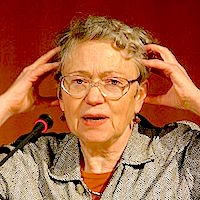
Mary Catherine Bateson
1939 CE –
“ Dr. Spock’s first baby,” daughter of Margaret Mead and Gregory Bateson, and after having “the best-documented childhood in the United States,” Mary carried on her parents’ intellectual and anthropological tradition writing and teachings in places like Harvard, George Mason University, and Amherst as well as leading organizations like the Institute for Intercultural Studies in New York. When a freshman in college after attending one of her mother’s lectures with a boyfriend, she lamented the possibility of ever having a good marriage after her mother and father’s example; she agreed to an engagement and wound up married to that same boyfriend for over 50 years.

John Lennon
1940 – 1980 CE
Poet of our age, 20th Century social conscience, inscrutable, uncompromising, brave and outrageous; John Lennon personifies the Lao Tzu lineage and left a lasting and profound impact on the international evolution of consciousness. Uncompromising psychological prophet, he distilled and magnified both our dark side shadows and bright, golden age potentials. Reviled by the Nixon administration and investigated by the FBI, he’s now number 8 on the list of 100 Greatest Britons. Anthem writer for the counterculture and the anti-war movement, reviled by the Nixon administration and investigated by the FBI, he’s now number 8 on the list of 100 Greatest Britons.
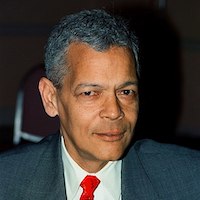
Julian Bond
1940 – 2015 CE
Courageous civil rights leader
Social activist, professor, politician, and leader of the civil rights movement, Julian Bond helped create SNCC (Student Nonviolent Coordinating Committee), the Southern Poverty Law Center, and became a 12-year chairman of the NAACP. He served 20 years in the Georgia legislature and 22 years as a University of Virginia professor. A strong and effective supporter of civil, women's, and gay rights, he received the National Freedom Award, the National Leadership Award, the Spingarn Medal, and 25 honorary degrees.

Bob Dylan
1941 CE –
Though thought of in many different ways by different people, at heart, Bob Dylan may most essentially represent a modern-day Taoist sage, a continuation of Lao Tzu’s lineage. Awarded the Nobel Prize for Literature in 2016 and called the “Shakespeare of his generation,” he wrote over 500 songs recorded by more than 2000 singers and sold tens of millions of albums. Though world famous for decades and beyond “successful” in numerous ways, his humility and refusal to make a big deal out of himself remains. His music and message transcends his voice and culture. As relevant today as it was in the 60’s, it continues as a major influence on our cultural conscience and consciousness. And this influence shows all signs of continuing far into the future.
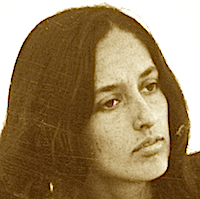
Joan Baez
1941 CE –
Famous but down-to-earth, proud but self-deprecating, a powerful speaker of truth to power; Joan Baez helped launch the civil rights and anti-war movements, social justice on multiple fronts including nonviolence, the environment, and human rights in general. A leader of the dynamic, counterculture social and political change of the sixties, she influenced the direction of American politics and world culture. For 60+ years, recording 30+ albums and songs in 8+ languages; her message of peace, compassion, and justice spread throughout the world both through her own direct example and through her relationship-with impact on people like Bob Dylan, David Harris, and Steve Jobs.
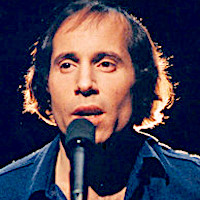
Paul Simon
1941 CE –
Prolific planter of musical, cultural wisdom seeds
One of the world’s most famous singer-songwriters since 1956 and still going strong, Paul Simon’s poetry and music has embedded inner space modules of wisdom in world culture and consciousness. His honors include 16 Grammys, 3 Albums of the Year, a spot on Time magazine’s "100 People Who Shaped the World,” and being listed on both Rolling Stone’s 100 Greatest Guitarists and 100 Greatest Songwriters of All Time. A strong advocate of music education for children, he has mentored many successful musicians and supported the non-profit Children's Health Project, The Children's Health Fund, the Turkana Basin Institute, and Little Kids Rock that provides free musical instruments and lessons for children in public schools. Through all the ups and downs of his careers, he’s continually recreated both himself and his music keeping his creative edge sharp and his social consciousness clear.
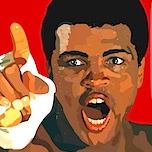
Muhammad Ali (Cassius Clay)
1942 – 2016 CE
Many easy accolades for Mohammad Ali but maybe the best is “A Muslim who put friendship and other people over dogma and belief.” A true citizen of the world, musician, poet, actor, political commentator, Civil Rights leader, counterculture icon, one of the most famous and celebrated sports figures of all time; he was arrested, convicted of draft evasion, mired in a Supreme Court trial but still became the only three-time lineal world heavyweight champion and the only boxer to be named Fighter of the Year five times. Graduating high school # 376 in a class of 391, he received an honorary doctorate from Princeton University. He actively supported Native American rights, the Palestinians, Israelis, poverty alleviation in Africa, peace in Iraq, and numerous philanthropic projects.
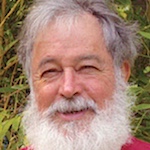
Red Pine ( Bill Porter)
1943 CE –
Exceptional translator, cultural diplomat
Son of a bank robber turned politician who became the wealthy head of the California democratic party, friends with the Kennedys and nominated for president by Eleanor Roosevelt but who later lost everything; Red Pine at an early age saw through the materialism of western culture and left the US for 22 years to study, practice, and translate in the Far East. After studying with John Wu, John Blofeld, and Chiang Kai-Shek’s personal master, Wu Ming, he traveled through Mainland China documenting his adventures with details about Chinese culture and history on over 1100 radio programs for Chinese audiences. His translations sink through the words, find the essence, and bubble the meaning up into beautiful and vivid English.
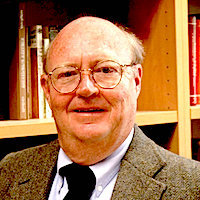
J. Rufus Fears
1945 – 2012 CE
Historian, educator, and serious student of lessons from the past applied to current affairs; Fears was voted Professor of the Year 3 times at the University of Oklahoma and 4 times at Indiana University. His lectures were so popular that none of the lecture halls were large enough to hold the thousands of students wanting to sign up for his classes in History and Political Science. A powerful force animating the relevance and meaningfulness of historical events and people, his last book was titled, Dangerous Delusions: Why We Ignore the Lessons of History at Our Risk. His insights however didn’t seem to extend much beyond the broad into the personal. He ridiculed health advice like exercise and diet, died at only 67 years old.
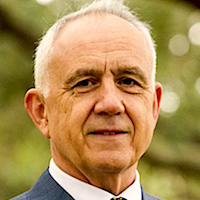
Jack Weatherford
1945 CE –
Jack Weatherford (1945 - )
Anthropologist, specialist in tribal histories and cultures, and deep thinker about the events and influences of historical events; Weatherford has worked hard uncovering the histories re-written by the victors like the many positive influences of American Indians on US culture, politics, medicine, agriculture, and ecology. This extended to the indigenous cultures of Bolivia, the Amazon, Mongolia and many other little known cultures. For this kind of work, he was awarded Mongolia’s highest national honor for foreigners.
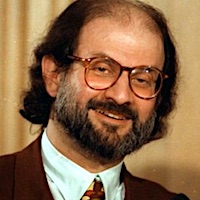
Salman Rushdie
1947 CE –
Fearless antagonist of Islamic fundamentalism
Prolific, award-winning, and fearless writer, Rushdie’s novels combine magical realism with historical fiction and concentrate on the interplays between Western and Eastern civilization. An antagonist of religious extremism and advocate for Islamic reform, his books were banned in many Muslim countries, he was put on an Al-Qaeda hit list, and the spiritual leader of Iran—Ayatollah Khomeini—issued a fatwā ordering his execution. When knighted on the English Queen’s birthday in 2007, mass demonstrations against him broke out in Malaysia and Pakistan while many Muslims campaigned publicly for his death. He supported Barack Obama’s election and the UK vote to stay in the EU, criticizes the Republican Party, champions ways to end racial discrimination, and actively supports feminism.
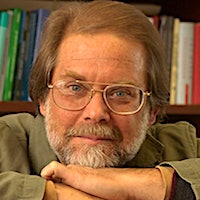
David Loy
1947 CE –
Zen teacher, philosopher, and ecological activist; David Loy studied with Yamada-roshi and Robert Aitken-roshi, completed a formal koan practice in 1988, and taught at Singapore University, Bunkyo University in Japan, and Xavier University in Ohio. With a focus on encouraging individual spiritual practice to extend to and help solve social and ecological problems, he lectures internationally, teaches workshops, and leads meditation retreats.
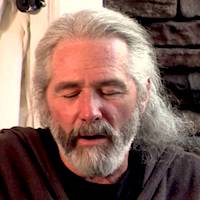
Daniel Ladinsky
1948 CE –
Wisdom lineage poetic channeler
American poet, translator, and interpreter; Ladinsky lived for 20 years in a Meher Baba spiritual community in India while working in free rural health clinics. Basing his work mainly on Rumi and Hafiz, he describes them not as translations but as interpretations and renderings faithful to the spirit though not to the words of these original sources. Frequently licensed and quoted by Christian, Buddhist, Hindu, Jewish, Muslim and Sufi leaders and organizations, and translated into many languages; his books maintain international best-selling status.
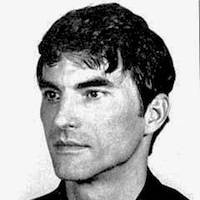
Thomas Cleary
1949 CE –
Translator of over 80 books from 8 different languages, Cleary mainly focused on translating Buddhist, Taoist, Confucian and Muslim classics never translated into English. Motivated by his own spiritual path and interest in Eastern wisdom and although credential in the scholastic world with a PhD from Harvard and a JD from Berkeley, he shunned the security of academic and institutional roles staying independent and shunning academic cliques, organized education, sectarian allegiance, and anything with shades of a cult. More recently his interests involve Comparative Constitutional Law and he has translated Gallic law texts written in Old Irish with the intention to help the American legal system evolve past its difficulties adapting to our ever-changing new technological world.
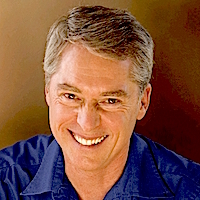
B. Alan Wallace (Bruce Alan Wallace)
1950 CE –
Translator, Tibetan Buddhist scholar, professor, and consciousness-studying scientist; Alan Wallace blended his 14 years as a monk and ordination by the 14th Dalai Lama with his scientific, research projects into understanding the nature of mind. He’s written 19+ books, many articles and papers, and translated innumerable Buddhist scriptures into understandable modern texts. However, his inclinations tend to gravitate more toward the words than the sense, the belief rather than the personal experience.
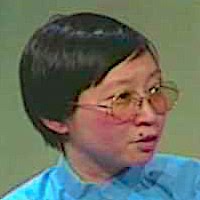
Eva Wong
(c. 1951- )
Champion of Qigong, Fengshui, and a Taoist approach to health and healing
Born in Hong Kong and growing up hiking and meditating in the mountains of the New Territories, Eva Wong connected with Taoism at an early age and became a translator and author of many books on Taoist arts, qigong, and fengshui. She began studying Tibetan Buddhism when only 7 years old and is the 19th generation lineage carrier of Xiantianwujimen Taoism (the Pre-celestial Limitless Gate School). She practices several Chinese Fengshui systems and consults on applying these principles for personal homes, commercial sites, and spiritual centers. In this tradition, she also specializes in qigong, divination, and the I Ching. Taking to heart the Taoist principles of simplicity, anonymity, and selflessness; she insists she is not a teacher, doesn’t publish pictures of herself, and doesn’t give out personal details like her birth date.
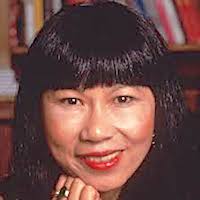
Amy Tan
1952 CE –
Rock and roll singer, bartender, and insightfully talented author
Rock and roll lead singer (in a band with Stephen King and Dave Barry), carhop, bartender, pizza maker, and insightfully talented author; Amy Tan has given the world memorable characters and a blended, wise view of world culture. A vivid example of how intense problems can transform into the evolution of goodness and wisdom, she had faced and transmuted challenges arising from a domineering, suicidal mother who once held a knife to her throat threatening to kill her, the murder of a college roommate, serious depression, and misdiagnosed Lyme disease that led to epileptic seizures. Exemplifying Einstein’s quote, “Great spirits have always encountered violent opposition from mediocre minds,” critics have accused her of perpetuating racial stereotypes, pandering to Western prejudices, and “casting Chinese men in the worst possible light.” If no negative reaction to a work of literature, it’s probably very insipid, meaningless, and not worth the time reading.
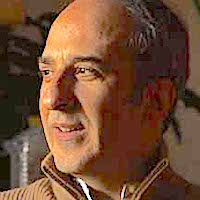
Peter Kingsley
1953 CE –
Sufi, mystic, author, philosopher, scholar; Kingsley describes a "flowering of consciousness” and the birth/beginning of western civilization during the pre-Socratic Greek period based on the influence of Parmenides and Empedocles. He describes Parmenides' nameless goddess who uses words as esoteric seeds and paradoxical divine logic to reveal unity and reality’s oneness. These seminal Orphic and Pythagorean views later distorted by Plato and Aristotle show remarkable similarities to early Buddhist, Taoist, and shamanistic traditions; modern Vedanta, Zen, and Dzogchen.
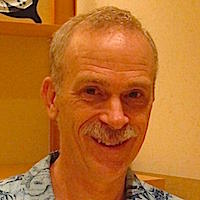
Charles Muller
1953 CE –
Tao Te Ching translator, American professor at a Japanese university, founder of an online Buddhist digital dictionary, Karate adept and an early pioneer in developing digital Buddhist resources with a focus on the Korean and Yogacara approaches; Muller also includes theological, Daoist, Confucian, Indian Buddhist and Zen approaches to his work. A strong influence in the field of Digital Humanities, his online publications include bibliographies, translations, reference works, and lexicons and his research extends into the fields of psychology, political and cognitive science.
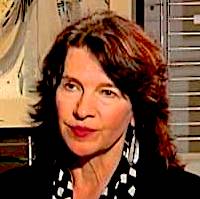
Louise Erdrich
1954 CE –
Chippewa wisdom-storyteller, poet, writer of 15 best-selling novels, Pulitzer Prize finalist, and World Fantasy Award winner; Louise was part of the first class of women admitted to Dartmouth College. A powerful voice for both Native American wisdom and rights, she refused an honorary doctorate from the University of North Dakota because of their Fighting Sioux mascot, wrote a novel about an historical lynching of four Native people based on trumped-up charges, hosts writers' workshops on the Turtle Mountain Indian Reservation, started and runs a “teaching bookstore” that also sells Native American jewelry, art and traditional medicines.
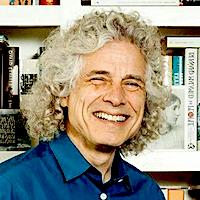
Steven Pinker
1954 CE –
Humanistic scientist, insightful cultural commentaror
Harvard professor, linguist, cognitive/evolutionary psychologist, humanist, and insightful cultural commentator; Pinker is considered “one of the world's most influential intellectuals.” Translating the significance of new scientific and psychological discoveries into common language, his many books help make these contemporary insights useful in everyday life. Emphasizing the psychology of cooperation and communication, he became a Two-time finalist for the Pulitzer Prize and Humanist of the Year in 2006. His current book, Enlightenment Now helps transmute pessimistic, nihilistic, and negative views into an energized and inspired optimism in relation to both our social and individual states of mind.
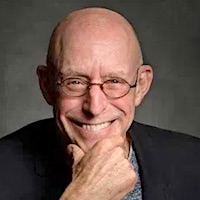
Michael Pollan
1955 CE –
Champion for Sustainable Agriculture
Journalist, professor, author, and social activist; Michael Pollan's in-depth and yet intriguing books and articles challenge many of our modern agricultural practices. His historical perspective on agribusiness and how it effects our health, environment, culture, and wellbeing clarifies the problems and gives clear directions toward solutions. He criticized and explained the problems with factory farming, GMOs, and the over-growing of corn effectively enough to provoke a fierce response from the concerned interest groups.
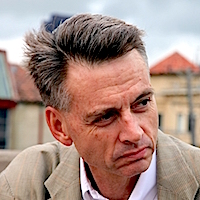
Robert Wright
1957 CE –
Radical centrist, army brat, popular professor, science editor, journalist and prize-winning author; Wright has applied his journalistic skills to translating and interpreting complicated scientific and religious principles. With understanding and insight, his books and articles disentangle the convoluted juxtrapositions interconnecting religion, philosophy, psychology, politics, and science. His decoding of the perspectives of evolutionary psychology and applying them to everyday life offers a valuable key to finding a sane way in these rapidly changing times.
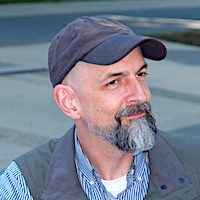
Neal Stephenson (Stephen Bury)
1959 CE –
Speculative futurist and cultural social commentator
Futurist, author, technology/culture/social commentator; Stephenson's writings span the range from speculative to historical fiction, from critiques of technology to mystery novels. He brings mathematics, science, and history into his novels; has worked on scientific spacecraft systems and developed innovative, collaborative writing projects. Seen at the time as "futuristic," many of his cultural descriptions and imagined technologies—self-learning nanotechnology, dynabooks, cyber cities—have become common place and well-known today.
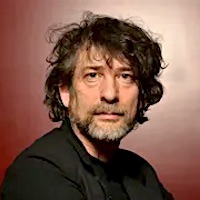
Neil Gaiman
1960 CE –
Myth-transmitting creative maelstrom
Creative cultural hero, inventive myth-making continuation, author and screen-writer par excellence; Neil Gaiman may be one of the most effective transmitters of ancient myths, symbolism and stories into modern culture. From comic books to television, from books to movies, from Twitter to FaceBook, his understanding of the basic dilemmas and opportunities facing our evolutionary potential seeps inextricably into contemporary zeitgeist. Winner of the Hugo, Bram Stoker, Nebula, Bram Stoker Newbery, Carnegie, and the British National Book Awards; his influence is huge and still growing.
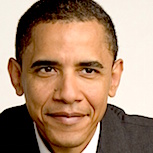
Barack Obama
1961 CE –
Winner of honors ranging from the Grammy Awards to the Nobel Peace Prize; Obama is the first African American US President, the first sitting president to visit Hiroshima, and first to address the African Union. In spite of single-minded and almost exclusive focus on opposing him by House and Senate Republicans, his accomplishments rival almost any American president. Beginning with one of the most dire financial crises in US history; he turned the economy around, greatly improved foreign relations, passed the Affordable Care Act, killed Osama bin Laden, reigned in Wall Street, restored relations with Cuba and made progress on fighting climate change, prejudice, workplace abuse, and gun control.
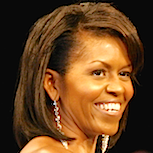
Michelle Obama
1964 CE –
An inspiring icon for black women, women and men of all races; Michelle Obama exemplifies quiet courage, dignity, and the deep “Te” described in the Tao Te Ching. Descendant of slaves, daughter of the working class, sister of American educational opportunities, and wife to good government; her influence on American culture is subtle but profound and goes far beyond her focus on poverty alleviation, LGBT rights, promoting good nutrition and healthy life style. Fashion icon on the cover of Vogue magazine and first First Lady to announce the winner of an Oscar; she also advocated for military families. Touring the world, she repaired and uplifted America’s image probably more than anyone since Benjamin Franklin.
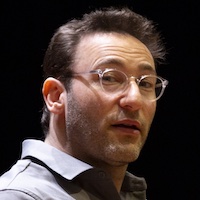
Simon Sinek
1973 CE –
Author of 5 books, motivational speaker, and highly respected business consultant; one of his TED talks became one of YouTube's all time most popular and his books have won best-selling status on both Wall Street Journal and The New York Times lists. Highly critical of the "trickle down" economic theory, he promotes instead the creation of safe, supporting, fulfilling, and inspiring work environments. His childhood in South Africa, London and Hong Kong gave him a more realistic, global perspective that easily goes far beyond the more narrow and nationalistic understandings of most usa-based business consultants.
Related Sources (2 sources)
A People's History of the United States by Howard Zinn
Ordinary Wonder by Charlotte Joko Beck
Quotes about the American (USA) Lineage (43 quotes)

“As much as I value an union of all the states, I would not admit the southern states into the union, unless they agreed to the discontinuance of this disgraceful trade, because it would bring weakness and not strength to the union… The augmentation of slaves weakens the states; and such a trade is diabolical in itself, and disgraceful to mankind.”
Comments: Click to comment

“We hold these truths to be Self evident: that all Men are created equal and independent… [with] Rights inherent and unalienable… the preservation of Life, and Liberty, and the Pursuit of Happiness; that to Secure these ends, Governments are instituted”
Comments: Click to comment

“Either force or corruption has been the principle of every modern government... This I hope will be the age of experiments in government, and that their basis will be founded on principles of honesty, not of mere force. We have seen no instance of this since the days of the Roman republic, not do we read of any before that.”
Comments: Click to comment

“America has proved that it is practicable to elevate the mass of mankind... She holds out an example 1000 times more encouraging than ever was presented before, to those 9/10ths of the human race who are born without hereditary fortune or hereditary rank.”
Comments: Click to comment

“The Americans have many virtues, but they have no Faint and Hope... They rely on the power of the dollar; they are deaf to sentiment. They think you may talk the north wind down as easily as raise society”
Comments: Click to comment
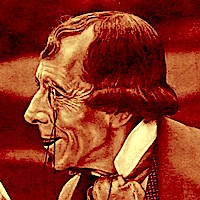
“With the aid of a few scientific discoveries, [Americans] have succeeded in establishing a society which mistakes comfort for civilization.”
Comments: Click to comment
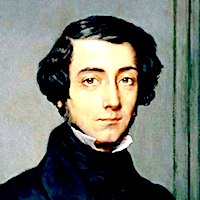
“I can see the whole destiny of America contained in the first Puritan who landed on those shores,”
Comments: Click to comment

“highly resolve that these dead shall not have died in vain — that this nation, under God, shall have a new birth of freedom — and that government of the people, by the people, for the people, shall not perish from the earth.”
Comments: Click to comment

“The American has dwindled into an Odd Fellow—one who may be known by the development of his organ of gregariousness, and a manifest lack of intellect and cheerful self-reliance.”
Comments: Click to comment
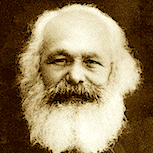
“From the beginning of the titanic struggle in America, the working men of Europe felt instinctively that the Star Spangled Banner carried the destiny of their class.”
Comments: Click to comment

“We Americans are the peculiar, chosen people—the Israel of our time; we bear the arc of Liberties of the world... almost for the first time in the history of the earth, national selfishness is unbounded philanthropy; for we can not do a good to America but we give alms to the world.”
Comments: Click to comment

“Come Muse, migrate from Greece and Ionia...
I heard that you asked for something to prove this puzzle, the New World,
And to define America, her athletic democracy;
Therefore I send you my poems”
Comments: Click to comment

“An Englishman is a person who does things because they have been done before. An American is a person who does things because they haven't been done before.”
Comments: Click to comment

“Bottled Lightning, in truth, is one of our American ideals... a wild-eyed look either of too desparate eagerness and anxiety or of too intense responsiveness and good-will... Intensity, rapidity, vivacity of appearance, are indeed with us something of a nationally accepted ideal”
Comments: Click to comment
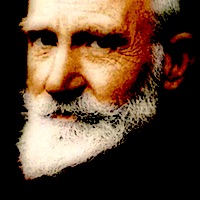
“A man who calls himself 100% American and is proud of it, is generally 150% an idiot politically... I myself have been particularly careful never to say a civil word about America.”
Comments: Click to comment
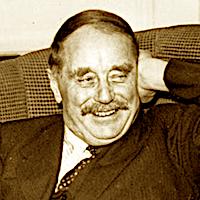
“The devil in the American world drama may be mercantilism, ensnaring, tempting, battling against my hero, the creative mind of man”
Comments: Click to comment

“He would not bleach his Negro soul in a flood of white Americanism, for he knows that Negro blood has a message for the world.”
Comments: Click to comment

“The American Revolution was not only a revolt of colonials against a distant government; it was also an uprising of a native middle class against an imported aristocracy.”
Comments: Click to comment

“I would rather have America lose her empire than have her forfeit all the inspiration that she has meant to mankind... I believe it would have been cheaper, as well as more humane, to export food and technical aid to impoverished areas to advise threatened governments to become welfare states, to prod the great landowners in those countries to allow a wider distribution of land, to persuade industrial magnates that higher wages make for expanding markets, rising profits, economic stability, and political peace.”
Comments: Click to comment
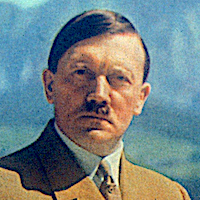
“my feelings against Americanism are feelings of hatred and deep repugnance. Everything about the behavior of American society reveals that it's half Judaised, and the other half negrified. How can one expect a State like that to hold together—a State where 80 per cent of the revenue is drained away for the public purse—a country where everything is built on the dollar?”
Comments: Click to comment

“I think the true discovery of America is before us, the true fulfillment of our spirit, of our people, of our mighty and immortal land, is yet to come; the true discovery of our own democracy is still before us... not only our living hope, but our dream to be accomplished.”
Comments: Click to comment

“I swear to the Lord I still can't see
Why Democracy means Everybody but me.
Oh, yes, I say it plain,
America never was America to me,
And yet I swear this oath—
America will be!”
Comments: Click to comment

“The white man's symbol is the square. Square is his house, his office buildings with walls that separate people from one another. Square is the door that keeps strangers out... gadgets, boxes—TV sets, washing machines, computers, cars... You become a prisoner inside all these boxes. More and more young white people want to stop being 'straight' and 'square' and try to become round, join our circle. That is good.”
Comments: Click to comment
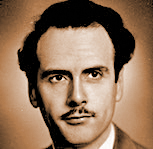
“The United States is by far the most visually organized country in the history of the world. It is the only country that was ever founded on the basis of phonetic literacy for all. All of its political and business institutions assume the ground plan of this literacy.”
Comments: Click to comment
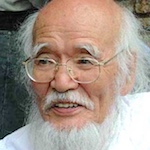
“Livestock farming for meat consumption... has totally unbalanced American land. America has established an agriculture that does not grow the stuff of human life, but caters instead to the hogs and cattle.”
Comments: Click to comment

“The United States became a nation in quest of itself… The new nation was to be not a citadel but a laboratory… More than any other modern people, we have been free of the curse of ideology, free to combine the nations, free to rise above chauvinism, free to take our clues from the delightful, unexplored, uncontested world around us… A raw continent made us flexible and responsive and we remain the worlds laboratory binding together peoples from everywhere by opportunities rather than ideologies”
Comments: Click to comment
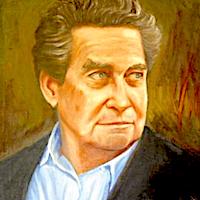
“The American War of Independence was the expulsion of the intrusive elements, alien to the American essence. If American reality is the reinvention of itself, whatever is found in any way irreducible or unassimilable is not American.”
Comments: Click to comment

“The American system is the most ingenious system of control in world history… There is none that disperses its controls more complexly through the voting system, the work situation, the church, the family, the school, the mass media—none more successful in mollifying opposition with reforms, isolating people from one another, creating patriotic loyalty.”
Comments: Click to comment
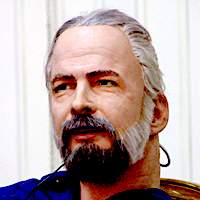
“The average American suffers from two delusions, one that God is dead and the other is that there is a difference between brands of cigarettes.”
Comments: Click to comment

“We may have all come on different ships, but we’re in the same boat now.”
Comments: Click to comment

“America is the fact, the symbol and the promise of a new beginning. And in human life, this possibility is among the most sacred aspects of existence.”
Comments: Click to comment

“American culture is going down the drain… an enormous degeneration… a culture that has no spiritual center, a culture that has money and education, but no sense of being at peace with the world, no sense of purpose in life.”
Comments: Click to comment

“I would like you to think twice about what you see as your role in this country. It doesn't matter so much about your own particular development. But you should pay some kind of attention to a society which is slowly decaying and full of maggots and worms. We don't want to sit here idle discussing subtleties of philosophy only pleasing ourselves while the rest of the people are suffering immensely... spiritually they are suffering, economically, politically people are suffering.”
Comments: Click to comment

“America's love affair with materialism provides a tremendous opportunity which is unique to this country... American speed and its neurosis are being put into rediscovering spirituality. America could become the world's leading spiritual center fairly soon, as soon as we get out of spiritual materialism and begin to realize what its consequences are.”
Comments: Click to comment

“The percentage of Americans who considered themselves happy peaked in 1957, although consumption has more than doubled since then... The fact that we in the developed world are now consuming so much more does not seem to be having much effect on our level of contentment.”
Comments: Click to comment
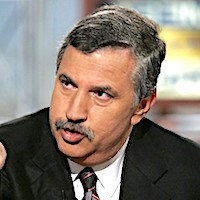
“America is the greatest engine of innovation that has ever existed, and it can't be duplicated anytime soon, because it is the product of a multitude of factors: extreme freedom of thought, an emphasis on independent thinking, a steady immigration of new minds, a risk-taking culture with no stigma attached to trying and failing”
Comments: Click to comment

“America is the greatest engine of innovation that has ever existed, and it can't be duplicated anytime soon, because it is the product of a multitude of factors: extreme freedom of thought, an emphasis on independent thinking, a steady immigration of new minds, a risk-taking culture with no stigma attached to trying and failing, a non-corrupt bureaucracy, and financial markets and a venture capital system that are unrivaled at taking new ideas and turning them into global products.”
Comments: Click to comment

“Americans may be under-educated, lazy, and disorganized, but they do one thing better than any people on the face of the earth, and that is watch television... You can tell lies to them and they'll never know.”
Comments: Click to comment
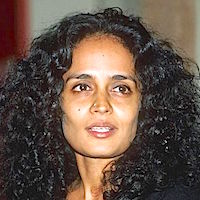
“In America, the arms industry, the oil industry, the major media networks, and, indeed, U.S. foreign policy, are all controlled by the same business combines.”
Comments: Click to comment
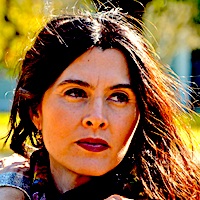
“America is a kind of ecosystem nourished by the displaced to whom it offers refuge. To welcome refugees here is also to carry seeds of tolerance, as if on the wind, back to relatives and friends in home countries razed by violence. These ideas, planted in their native soil, could take root and flourish.”
Comments: Click to comment
Comments (0)